#(i liked gordon a lot but i credit the actor more than the writing for that one)
Explore tagged Tumblr posts
Text
you gotta admire the commitment genre creators have when it comes to using black people as the stand in for the bigot in their allegories of racism (or gay people in their allegories of homophobia). I very much doubt a single person went to them and praised them for how smart and revolutionary and NEVER DONE BEFORE these storylines are (less due to enlightment than to indifference, probably). yet they keep at it.
#this is about#charles pike#but also about gordon in spn and bill in tvd#and many such examples añldskfjaf#i will concede that pike is different than gordon in this regard#(i liked gordon a lot but i credit the actor more than the writing for that one)#but still it's hmmmm. something.#then we eventually get to lincoln's murder and how the timing of it related to real world events and we're again entering a really shitty t#stacked100#talking to the void#my thoughts#t100 thoughts#the 100 3x04#the 100#bitter lau tag
21 notes
·
View notes
Note
Can I ask what you think of people wanting to change percy Jackson's ethnicity for the tv series ?
Okay so this ask is very old and was sent before the casting news came out (sorry for taking forever to answer), but since Annabeth, Grover, and a few other characters were racebent for the series I think it's still relevant enough to answer. I have lots of complicated thoughts on racebending in general, mostly for two reasons:
It's often used in superhero-based media specifically as an excuse for companies to engage in erasure by omission while still getting credit for "increasing diversity": why bother using Cassandra Cain or Duke Thomas when you can simply cast a black woman to play Barbara Gordon and a biracial Black/Asian kid to play Tim Drake (but refuse to do any creative work to engage with how Babs' and Tim's lived experiences and crimefighting perspectives might be different if they weren't white), for example.
It's also often a signal that a company simply does not care enough about the character to ensure they look visually similar to how the source material depicts them; it's also why I heavily dislike whitewashing, because (besides whitewashing being a lovely example of Hollywood's racism) a lack of care regarding visual appearance in adapted media is often an early warning sign that the adaptation is going to have a lack of care for the source material in general, just like Brunette!Annabeth in the Percy Jackson movie was an early warning sign that the movie was going to be a truly terrible adaptation of the PJO books (basically, "if you can't even bother to make her blonde, what else don't you care about getting right?")
However, I don't inherently have a problem with racebending when it's in tune with the intention of the source material and thought/care is put into how an adapted character being a different race than that character is canonically depicted might change their lived experiences and perspective on life. Given that, there's a few reasons why I don't have much of a problem with the racebending in the Percy Jackson show:
One, Rick Riordan is heavily involved in the creation of the show this time around. I'm not particularly worried that the characters' visual appearances not closely matching their canonical appearances is an indication that we're going to get another terrible adaptation, because Riordan was involved in the writing and casting process; it's clear this isn't just an empty corporate choice to gain brownie points with the progressive crowd, but is actually because the creative team felt like they were the best actors for the job.
Two, it's in the spirit of Riordan's intentions when writing the books, which was always to give under-represented groups stories that showcased them in heroic, protagonist-level roles. He wrote the PJO series for his son, who had ADHD and dyslexia, and in every subsequent post-PJO series he's made a notable and purposeful effort to increase positive representation of various under-represented and marginalized groups by including them in his stories (whether he's been successful is a different question, but that's a topic for another time). So I don't feel particularly uncomfortable with a character being racebent, because if Rick were writing PJO today I think most of us can agree the books probably would have been quite a bit more racially diverse than they are.
Three, the characters who've been racebent are either characters whose arcs and struggles can be updated for social relevance if they're racebent or are characters whose race doesn't matter (and are thus an example of "well...if it doesn't matter, why not?").
Annabeth, for example, has a minor subplot in the early books about being percieved as a "dumb blonde." This stereotype is outdated and somewhat incomprehensible for a 2022 audience who weren't middle schoolers in 2005 when Paris Hilton and Lindsay Lohan were running around, dumb blonde jokes were a dime a dozen, and Hollywood was putting out movies like Legally Blonde as a direct critique of that stereotype. It's simply not a salient cultural issue anymore.
But in the spirit of that subplot, Annabeth being a black girl who has to deal with and defy stereotypes about black girls being smart (of which there are many) is a lovely update that speaks to current issues without actually changing anything about Annabeth: she still has a subtle chip on her shoulder because she feels pressure to defy stereotypes relating to intelligence. It just comes from a different place now. So casting a black girl is actually lowkey a brilliant decision, even if I still hope they'll make her blonde.
For Grover, it makes no difference either way. Yes, he's canonically white in the books, but visually race has no impact on him because he's a satyr; canonically, his hooves and horns pose the biggest issue for him when he's trying to blend into the human world and do his job. His life doesn't really change in any way if he's a different race; as long as he remains identifiably Grover, it makes no difference whether a white boy or a black boy or a desi boy plays him.
tl;dr: "I have a lot of complicated feelings on racebending in general and in most circumstances, I really urge creators to either create new characters or find ways to effectively utilize existing diverse character slates. However, in the case of Percy Jackson I have no real problem with it because it's in the spirit of the original work, isn't a reflection of a studio's lack of regard or care for accurately adapting the source material, helps keep the social commentary embedded in said source material up-to-date, and is clearly a creator-led decision rather than a corporate marketing decision."
103 notes
·
View notes
Text
Why Do I Have a Spaghetti Western Fetish?
By Stephen Jay Morris
4/17/2022
©Scientific Morality
Everyone has an opinion about everything they see and touch. Except for physical reality: A tree doesn’t have an opinion. Human beings do! If you don’t have an opinion about something you encounter, then you are in a coma.
Every person is a unique individual. They can express their opinions by writing an essay or painting a picture; by speaking, singing, dancing, acting, or through countless other ways. That is why totalitarian nations censor the Arts. You can convey your message in many more ways than writing an essay like this one. A lot of my generation, simply by listening to anti-war songs on their transistor radios, became anti-war activists. All to say: here is my take on the film genre known as ���Spaghetti Westerns.”
This article will not give the usual takes on the genre; i.e. I won’t talk about the directors or the actors. I won’t even talk about the movies themselves. Instead, I will talk about the politics of European film makers’ images of the USA. I will talk about American Cultural Imperialism.
Like Disneyland, I hated American Westerns, also known as “Hamburger Westerns.” Why? Because of that old topic of good versus evil. Those Westerns were so clean. The hero wore white and the villain wore black. The white guy got the girl and the bad guys got the bullet. When some baddie got shot, there was no blood shed, just a “hole” in the middle of his forehead. These films were also blatantly racist. The Mexicans were bandits and the Indians were savages. Some of the scripts even incorporated modern day slang, directly from the period of the movie’s release! The filmmakers never did historical research. You’d hear crap like, “Yeah, that’s a swell gal you have there! I like her gams.” There were never any prostitutes in these films, only dance hall girls. And the West was never clean like it was depicted. There were also the patriotic messages. During the 50’s in the USA, terrible movies were produced. The “communist scare” was prevalent in teenage movies: Space invaders were the communists. Well, in these Westerns, the Indians were the Soviets. Now, what does this all mean? There was never a Hamburger Western that depicted the true, historical West.
Oh—another thing. In a game I played with my friend, whenever we were cowboys in a gunfight, we could count how many rounds my friend would fire with his six shooters. They usually shot 21 bullets in one round. American Westerns insinuated that the gun was a magic wand, with killing being the solution to all problems.
Now, here is why I prefer Euro Westerns to Hamburger Westerns: They are far more accurate. For one, most of the so-called cowboys were not clean-cut, all American boys. The colloquial phrase for most cowboys then was “Saddle Bums.” The true West was dirty, grungy, and sweaty, with shabby clothes and stubble on dusty faces. There were also lots of diseases back then because of poverty and uncontrolled bacteria; like Small Pox, for example. Then, there was the genocide of the Native Americans. The Italian “Spaghetti Western” films provide an honest portrayal of 19th Century America.
So, why do I love Spaghetti Westerns? When I was a 13 year-old boy, to pass the time, I went to afternoon matinees at a theater in Hollywood. It was called the “Gordon Theater.” One Saturday I walked in during the middle of a movie called, “The Good, the Bad, and the Ugly.” Now, most Spaghetti Westerns were filmed in the Spanish desert. This movie’s landscape looked like Nevada. Of course, I didn’t know this at the time; I figured it had been filmed in the USA. The fighting scenes were gorey and realistic. When anybody got shot, they cursed and cried in pain. I’d never seen that in American Westerns. Then, Ennio Morricone’s hypnotic soundtrack synced perfectly with the cinematography of Toni Deli Colli. Since I’d come into the theater after the picture had started, I didn’t see the credits. And, I usually read credits. I later learned that the director was Sergio Leone. I would become an unwavering fan for life.
The making of Spaghetti Westerns lasted for two decades—the 60’s and the 70’s. To see the American West through the lens of Euro directors with a Leftist’s perspective, about a time in American history, is fascinating to me. Some of the European filmmakers just wanted to make a fast buck from this Western craze. There were approximately 550 of them made. Some were just awful with bad English overdubs and recycled musical soundtracks. Others ended up as late night features on television. There were no VCRs back then, so if you wanted to watch one, you’d have to be up at two in the morning. Ultimately, about 35 of them are classics. As for the rest, not so much.
The best Spaghetti Westerns used symbolism in their stories: the town’s sheriff represented the U.S. government; the townspeople represented the American people; the Native Americans represented the Third World; the corrupt land owners represented American corporations while the small church represented the religious Right; the Mexican Bandits represented an inner city gang or communist revolutionaries; and the bounty hunter represented the mercenary who was in it just for the money. The banks were represented by the town’s bankers. The bulk of their plots was about finding or getting the gold. Sometimes, it involved avenging the murder of a loved one.
So far, I have seen about 150 of them. I plan to see many more.
4 notes
·
View notes
Text
The Batman 2022 spoiler free reactions
This version of Gotham is below sea level and also correctly located on an Island. They just built a wall and stuck everyone in what is essentially a big bowl. I assume if it rains too hard, the bowl fills up and everyone drowns.
This is somehow both even stupider than anything Nolan thought up, and the most Gotham idea I've ever heard, and I don't know how I feel about it.
Anyway, actual reactions below the cut, both because they got kind of long, and because I didn't love the movie (I didn't hate it either, for the record, but on balance my thoughts tend towards the negative) and I know some of you aren't here for criticisms of movies you liked and that's totally cool.
People who did a great job:
Robert Pattinson (I'm assuming that the directors notes were that everyone watching should be able to tell at a glance that Batman smells like a Sephiroth cosplayer on day 3 of an anime convention, and that is exactly the energy he brought to his performance, and it was strangely enjoyable to watch)
Colin Farrell (he is wearing so many prosthetics and consistently moving his face like a person not wearing a fuck tonne of prosthetics. He also managed to look, sound, and move nothing like Colin Farrel, which is perfect, because Colin Farrell should not play the Penguin, which turns out to be exactly why Colin Farrell should play the Penguin)
Michael Giacchino (composer) (the score was weird and interesting and managed to be extremely noticable without detracting from the movie)
Michael Fontaine & Yoichi Art Sakamoto (did the Penguin prosthetics)
David Crossman and Glyn Dillon (designed the Batsuit) (easily the best live-action Batsuit, achieved everything the Nolan & Snyder movies designs failed to)
The entire sound team, especially foley (the sound editting was great, I want this Batman to fight Onomatopoeia next)
The entire lighting team (the movie is extremely dark but I could consistently see what what going on, a very difficult tightrope to walk, although there was definitely more flashing lights than was remotely required in places)
Zoe Kravitz's stunt double(s) (they don't credit which performer doubled for which role, so I don't know their name, but Selina's fights were far and away the best in the movie, they did great)
People who did an okay job:
Zoe Kravitz (probably not her fault, so much of the role depended on her and Pattinson having chemistry and they have negative chemistry, which left her with very little to work with. there was a quality to the performance I can only describe as 'if it comes out in a few years that she was miserable and hated working on this my reaction will be oh that explains a lot')
Jeffrey White (mostly fine, but the decision that Jim Gordon should also do a Batman voice was fucking insane. this is the director's fault, not the actor's, but it still detracted from every other part of the performance)
Andy Serkis (he's on screen for all of 2 minutes in a 3 hour movie, short of chewing scenery like nick cage there's really nothing he could have done to stand out)
James Chinlund (production designer)
Robert Pattinson's stunt double
Lucy Bevan & Cindy Tolan (casting directors)
Robert Alonzo & Daniel Arrias (stunt co-ordinators)
Whichever junior production assistant was told to play the Arkham Games and then recount them back to the writers because they didn't want to read any comics
People who did a bad job:
Paul Dano (I hated every moment he was on screen & I hated every decision he and the director made about how the part should be played)
John Turturro (genuinely spent the entire movie thinking this was a woefully miscast Con O'Neill, turns out it was John Turturro doing an impression of Con O'Neill, which is even more baffling)
Matt Reeves (director) (not everything wrong with this movie is a directorial failing, but since the ones that aren't are failures of writing and he also co-wrote it, I'm just going to conclude that he fucked up)
Grieg Fraser (DP) (the movie being out of focus is not a style choice, it's a sign something has gone very wrong with your director and DP)
Whoever decided it would be cool if Bruce watched Selina through her bedroom window while she got changed
Honestly just whoever decided to be quite so creepy about Selina in general (I genuinely think Selina being choked gets more screen time than Alfred does, to give you some scale)
Whoever was in charge of the latte art. That was bad latte art.
Whoever was playing you know who in the cameo with riddler at the end. I'm not going to spoil anything for people who haven't seen it, but the whole thing was a terrible idea, that felt strongly like they didn't believe in that anyone would like their movie so they panicked and stuck a more popular character in at the end, but even if it had been a good idea, that performance was shocking. Hated it.
People who did a wildly inconsistent job:
William Hoy & Tyler Nelson (edittors) (this movie is 3 hours and I swear if you halved the length of every reaction shot it would be 2 and half hours tops, and the car chase is a fucking travesty, but there's also some really nice moment to moment editting, but also this movie is 3 hours long and it absolutely didn't need to be)
Jacqueline Durran (costume designer) (loved the decision to put selina in a bullet bra, hated the tiny balaclava, loved bruce's depression pajamas, hated every single aspect of riddler's design)
Matt Reeves & Peter Craig (writers) (there's some stuff I really love in this script, there's some stuff that is unintentionally absolutely hilarious, and there's some stuff that honestly probably should have got this entire project put on hold until a major rewrite could be done)
#jupiter watches a thing#the batman#if i meet the person who chose the name for this movie i'm going to fill all their shoes with cold custard#instead of watching this movie you could go an watch the batman 2004 instead#you'll have a much better time#and batman will not watch a single woman undress without their knowledge#i think the inevitable linkin park AMVs for this will actually be the best way to consume this movie#just 3 minutes of the best moments of pattinson playing an unwashed weirdo#set to numetal#i don't regret watching it#i never want to watch it again#and i am in fact intending to rewatch all my favourite episodes of the batman 2004 to cleanse my soul
2 notes
·
View notes
Photo
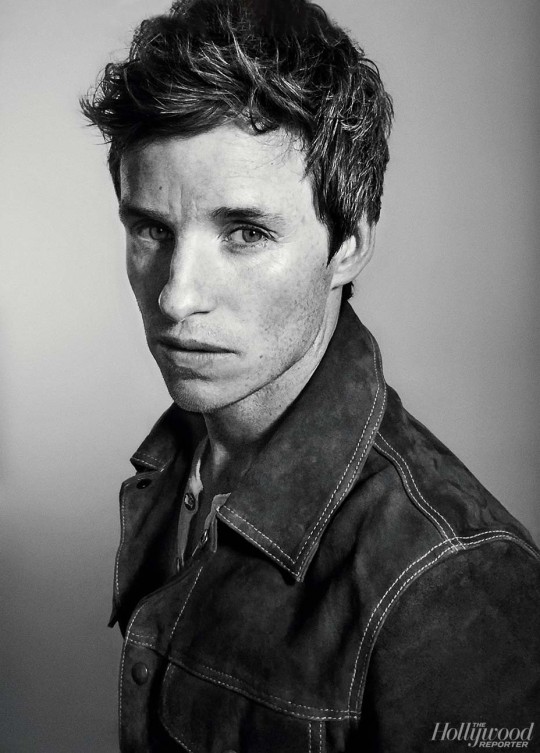
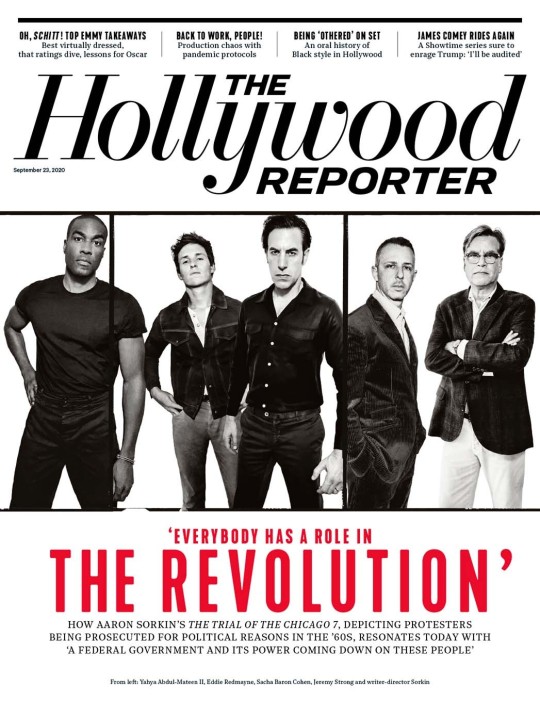
photos by Frank Ockenfels
The Long Journey and Intense Urgency of Aaron Sorkin's 'The Trial of the Chicago 7'
by Rebecca Keegan September 23, 2020, 6:00 am PDT
The director of the Netflix film, which stars Sacha Baron Cohen, Jeremy Strong, Eddie Redmayne and Yahya Abdul-Mateen II, reveals why it took nearly 20 years to get the project about the politically motivated prosecution of protestors made and why it couldn't be more timely: "I never imagined today would go so much like 1968."
In October 2019, hundreds of protesters marched down Chicago’s Michigan Avenue toward the Hilton, chanting phrases like "No justice, no peace!" and "A people united will never be defeated!" as police in riot gear descended on the crowd with billy clubs and tear gas. Earnest and energized, clad in 1960s period costumes and flanked by vintage police vehicles, this group thought they were acting out the past, staging a scene from Aaron Sorkin’s The Trial of the Chicago 7. As it turned out, they were performing the future, too.
Sorkin’s film, which opens in select theaters Sept. 25 and hits Netflix on Oct. 16, tells the story of the riots at the 1968 Chicago Democratic National Convention and the circus-like trial of political activists that followed the next year. Thanks to Hollywood development hell, the movie is arriving 14 years after Steven Spielberg first mentioned the idea to Sorkin but just as its themes and plot points — civil unrest, a self-proclaimed "law and order" president’s vilification of protesters (Nixon then, Trump now), the police’s excessive use of force, tensions within the Democratic Party over how far left to move — have become bracingly current."I never wanted the film to be about 1968," Sorkin says in an interview over Zoom from his house in the Hollywood Hills on Labor Day weekend. "I never wanted it to be an exercise in nostalgia or a history lesson. I wanted it to be about today. But I never imagined that today would get so much like 1968."For only the second time in a career spanning nine films as a screenwriter, Sorkin serves as director with Chicago 7, helming a sprawling ensemble cast that includes Eddie Redmayne as anti-war activist Tom Hayden, Sacha Baron Cohen as Youth International Party (Yippie) provocateur Abbie Hoffman, Succession’s Jeremy Strong as counterculture figure Jerry Rubin and Watchmen’s Yahya Abdul-Mateen II as Black Panther party co-founder Bobby Seale. There are undeniable parallels not only between the film and the present political moment but also between the performance-art activism of the actors and the men they’re playing, most vividly Cohen, who, like Hoffman, has made a career of political self-expression through comedic stunts, including crashing a far-right rally in Olympia, Washington, this summer while pretending to be a racist country singer. (Cohen, who shoots most of his satirical projects incognito, impishly calls reports of his appearance at the rally "fake news.")Eight months after Sorkin filmed the protest scenes in Chicago, Abdul-Mateen was marching in Black Lives Matter protests in West Hollywood, as was Strong in Brooklyn. "There’s power when a lot of people come together to protest out of anger, out of frustration," Abdul-Mateen says. "Everybody has a role in the revolution; this film shows that.
"Though the movie feels crafted for this political moment, it was born of another. At Sorkin’s first meeting with Spielberg, "I remember him saying, 'It would be great if we could have this out before the election,'" Sorkin says. The election Spielberg was talking about was 2008’s, when Barack Obama and Joe Biden faced John McCain and Sarah Palin.The film hit multiple roadblocks, beginning with the 2007-08 writers strike and continuing as financing faltered repeatedly, a fate illustrated by the more than 30 producers who can claim some sort of credit on Chicago 7. It took another unscheduled detour this summer after Sorkin finished it as the pandemic worsened, and the odds of original distributor Paramount mounting a successful theatrical release before the Nov. 3 election seemed increasingly slim. For some involved with the film, there is a question about the ethics of Hollywood inviting audiences to return to theaters before a COVID-19 vaccine is widely available. "
There’s a moral quandary that we, the motion picture business, have to be careful that we don’t become the tobacco industry, where we’re encouraging people to do something we know is potentially lethal," says Cohen.Before his visit to Spielberg’s Pacific Palisades home to discuss the project on a Saturday afternoon in 2006, Sorkin knew next to nothing about the Chicago 7. The federal government had charged seven defendants — Hoffman, Rubin, Hayden, David Dellinger, Rennie Davis, John Froines and Lee Weiner — with conspiracy for their participation in the protests against the Vietnam War outside the Democratic National Convention. (Originally the men were known as the Chicago 8 and included Seale, who asked to have his trial separated from that of the others and postponed so that he could be represented by his preferred lawyer, who was ill; that trial never took place.)
When Spielberg proposed a movie about the riots and the trial that followed, Sorkin, who was 7 in 1968, said, "'You know, that sounds great. Count me in.' As soon as I left his house, I called my father and said, 'Dad, do you know anything about a riot that happened in 1968 or a crazy conspiracy trial that followed?' I was just saying yes to Steven."Despite his ignorance, Sorkin was a logical choice to write the project: Having penned Broadway’s A Few Good Men and its 1992 film adaptation as well as the long-running NBC series West Wing, he’d shown a flair for dramatizing courtroom procedures and liberal politics, and he turned in his first draft of the Chicago 7 script in 2007. Originally, Spielberg planned to direct the project himself, but by the time the writers strike was over, he had moved on and a number of other potential directors circled, including Paul Greengrass, Ben Stiller, Peter Berg and Gary Ross, though none was able to get it off the ground. "There was just a feeling that, 'Look, this isn’t an Avengers film,'" Sorkin says of the studios' move away from midbudget dramas and toward action tentpoles in the 2010s. "This isn’t an easy sell at the box office. And there are big scenes, riots, crowd scenes. How can this movie be done for the budget that makes sense for what the expectation is at the box office?"As the project languished, Sorkin tried writing it as a play, ultimately spending 18 months on a fruitless effort to fashion a stage treatment. "What I didn’t like was having a script in my drawer," he says. "I was just thinking, 'Jeez, this is a good movie and it feels like it’s stillborn.'"It was the confluence of two events that ultimately revived the film with Sorkin in the director’s chair in 2018 — the 2016 election of Donald Trump and the 2017 release of Sorkin’s well-received directorial debut, Molly’s Game, which doubled its production budget at the box office. "This is before George Floyd and Breonna Taylor and police protests or confrontations," Sorkin says. "This is just when Donald Trump was musing nostalgically about the old days when they used to carry that guy [a protester] out of here on a stretcher and punch the crap out of him."With Trump’s throwback rhetoric lending the subject matter a new timeliness and Sorkin’s directing chops confirmed in Spielberg’s eyes, the movie moved forward with its screenwriter at the helm.
Cross Creek Pictures came in to finance, and Paramount bought the domestic rights. But all those years in development had left an expensive imprint on the project — a jaw-dropping $11 million had been spent on casting costs, producing fees and the optioning of Brett Morgen’s 2007 documentary about the event, Chicago 10, leaving just $24 million for the actual 36-day production.
One way Sorkin attempts to achieve a sense of scope despite that budget is by intercutting real black-and-white news footage with his dramatized protests. He rounded out his large cast with a deep bench of experienced and award-winning actors including Oscar winner Mark Rylance as defense attorney William Kunstler, Oscar nominee Frank Langella as Judge Julius Hoffman, Joseph Gordon-Levitt as prosecutor Richard Schultzand, Oscar nominee Michael Keaton as former U.S. Attorney General Ramsey Clark — with the filmmaker and many of his actors working for scale. (Abdul-Mateen and Strong both became first-time Emmy winners Sept. 20.)Sorkin shot the protest scenes on location in Chicago and built a courtroom set in an old church sanctuary in Paterson, New Jersey, because none of the available courtroom locations in the Garden State conveyed the scope he wanted. "If we’re saying the whole world is watching, I want a packed courtroom for six months full of press and spectators," Sorkin says. "I wanted the big, cavernous feeling of the federal government and its power coming down on these people."
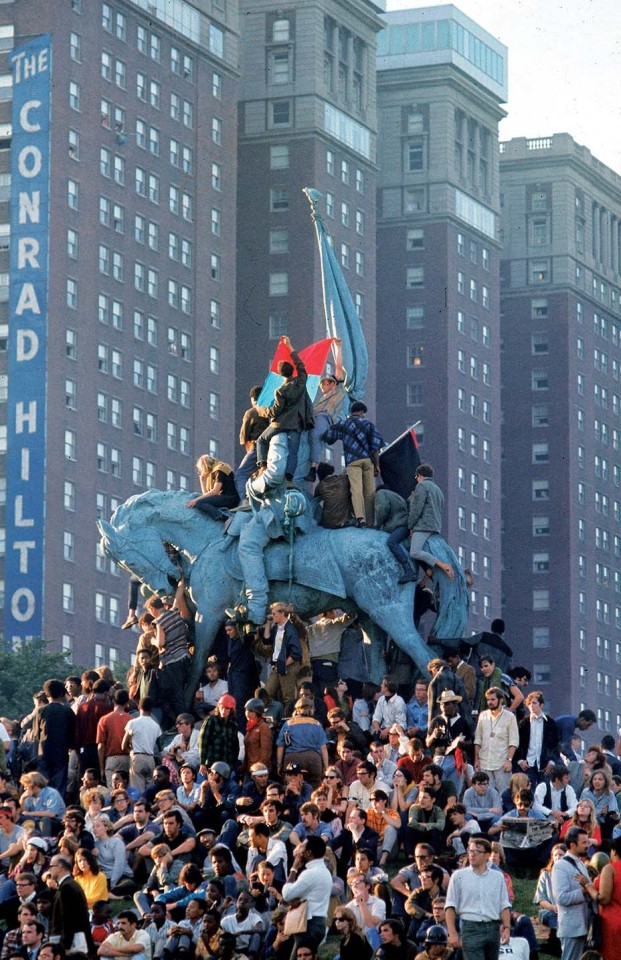
Julian Wasser/The LIFE Images Collection via Getty Images/Getty Images "The movie is tribute to the bravery of the protesters of 1968 [pictured] and today in Belarus, on the streets of America, in Portland," says Cohen.
Among the vestiges of Spielberg’s original plan was the casting of Cohen as Hoffman, which required the London native to affect a Boston accent and return to a subject he had studied as an undergraduate at Christ’s College in Cambridge, where he wrote a thesis paper about Jewish activists during the civil rights movement. At 19, Cohen had interviewed Bob Moses, the leader of the Student Nonviolent Coordinating Committee, which Hoffman was involved in before he founded the anti-war Yippie movement. "Honestly, I was very proud of the fact that Jews were involved in the Black civil rights movement in the '60s, and there wasn’t much written about it," Cohen says, explaining his youthful scholarship.
There’s a clear line to draw between Hoffman’s 1960s theatrics — which included throwing fistfuls of money into the gallery of the New York Stock Exchange and vowing to levitate the Pentagon — and Cohen’s contemporary TV and film pranks. Perhaps among Cohen’s most memorable and pointed gags was getting Vice President Dick Cheney to gleefully autograph a waterboard kit, which the comic did while posing as an admiring Israeli anti-terror expert for a 2018 episode of Who Is America?, his Showtime series. “What I wanted to do was to show that he was proud of torturing," Cohen says. "I could not believe how happy Cheney was to be sitting next to an uber-fan. So, yes. Ultimately in the shows and the movies that I do, I’m trying to be funny, but yeah, I’m trying to get out the anger that I have within me."
Cohen sees Hoffman’s unorthodox protest methods as pragmatic. "The Yippies were underfunded, and he was using theatricality to gain attention for his aims," Cohen says. "He wanted to stop the war. And how do you do that? You use stunts and absurdist humor to try to effect change." The actor estimates that, after researching Hoffman, he pitched Sorkin hundreds of lines the activist had really delivered. "As an annoying person with a lot of chutzpah, I was emailing Aaron every other night until morning, 'What about this line? What about this line?'" Cohen says. The writer-director, known for his exacting prose, politely tolerated the suggestions while largely sticking to his own script.
As Rubin, Strong is playing Hoffman’s conscientious jester sidekick, a role wildly different from the tragic, wealthy approval seeker he portrays on Succession. Strong added some of his own dramatic flourishes, including painting words on his chest for one courtroom scene and bringing a remote-controlled fart machine to disrupt Langella’s imperious judge. "I wanted to channel as much as possible that spirit of the merry prankster and of joyous dissent," Strong says. Hoffman and Rubin’s real-life personae were so large that Sorkin at times asked his actors to dial down their faithful portrayals, requesting, after one particularly jubilant take, "less cowbell."
Sorkin’s script draws a sharp contrast between Hoffman and Rubin’s campy methods and Hayden’s more reserved approach to the anti-war movement, with the tensions between Hoffman and Hayden supplying the film’s key relationship in a kind of begrudging brotherhood of the peace movement. To learn more about Hayden, Redmayne studied remarks that Jane Fonda, who was married to the activist and politician from 1973 to 1990, made upon his death in 2016. In his own life, Redmayne is cautious when it comes to discussing the role that he, as an actor at the center of a huge studio franchise (Warner Bros.’ Fantastic Beasts) might have in political life. "I find it endlessly challenging," Redmayne says of navigating his public activism. "There’s the elitist thing. It’s speaking up on climate change but being conscious that you’re traveling a lot. One has to be aware of one’s own hypocrisies, because they can be detrimental to something you believe in. So sometimes I find that I have to live my life and speak to my advocacy in a way in that it’s around friends, family and people I know rather than making something public."
Abdul-Mateen has begun his acting career largely associated with fantastical roles, like Dr. Manhattan on HBO’s Watchmen, Black Manta in Aquaman and Candyman in the upcoming Jordan Peele-produced remake of the slasher film. Playing Seale represented a chance to do more grounded work and to depict a man who had loomed large during Abdul-Mateen’s childhood in Oakland, where Seale co-founded the Black Panthers in 1966 and later ran for mayor. Seale’s inclusion in the original Chicago riots indictment was controversial and strange — prosecutors accused him of conspiring with men he’d never met after visiting Chicago that week for only a few hours to deliver a speech. For the prosecution, Seale functioned largely as a prop to tap into the fears of white jurors and white Americans watching the news coverage, and during the trial he had no attorney. "I wanted to key in on, how did Bobby Seale survive this trial?" Abdul-Mateen says. "How did he survive the gross mistreatment by the United States government, and how did he go through that with his head high and not be broken? It was an exercise in finding my pride, finding my dignity."
In one scene, Seale is brought into the courtroom bound and gagged, and throughout the trial he is kept separate from the white defendants. "Although it was meant to be a humiliating act, I walked out with my chest high, with my head high. Bound and gagged and everything else. It would be very dangerous for a Black man in that time, even sometimes today, to show the proof of the wear and tear that oppression can take on a person, because that can be seen as a sign of weakness, and a sign of weakness is an open door that it’s working." For the moments of lightness that Cohen and Strong bring to the movie, Abdul-Mateen supplies ballast. "It’s important for the right reasons and at the right time to make art that makes people uncomfortable," he says.
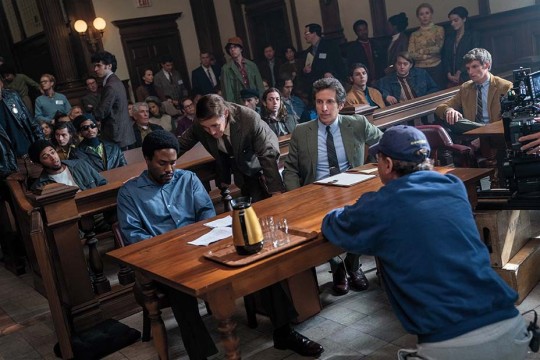
Niko Tavernise/NETFLIX. On the set, from left, Yahya Abdul-Mateen II, Mark Rylance, Ben Shenkman, Aaron Sorkin and Eddie Redmayne
Spielberg has remained involved in the film "in an emeritus role," Sorkin says, "from giving me good script notes to casting to notes on early cuts of the film." He also showed up to the New Jersey courtroom set. "When you have to direct a scene in front of Steven Spielberg, you’re not at your most relaxed necessarily," Sorkin says. Spielberg did not, however, take an executive producing credit on the film and declined to be interviewed about it.
The decision to switch to a streaming release came after an early summer marketing strategy call between Sorkin, Paramount chief Jim Gianopulos, other Paramount execs and some of the film’s producers. "At the end of the call, Jim said, 'Listen, we don’t know what the theater business is going to look like in the fall. We have troubling data telling us that the first people back in movie theaters are going to be the people who think that the coronavirus is a hoax,'" Sorkin says. This was clearly not the intended audience for a movie whose heroes are liberal activists. "I said, 'I don’t think the Idaho militia are going to be the first people coming to this movie,'" Sorkin says.
The group agreed to explore alternatives and gave Netflix, Amazon, Apple and Hulu 24 hours to watch the film. After a bidding war, Chicago 7 landed at Netflix in a $56 million deal against its $35 million production budget, with a robust marketing campaign and promise of a theatrical release. "We knew we didn’t have the option of 'Let’s wait a year,'" Sorkin says. "This is what we’re thinking about and what we’re talking about right now, and it just would have been a real shame to not release it now."
After Chicago 7 opens in limited release, Netflix will add more theaters in the U.S. and abroad throughout October, expanding upon the film’s premiere on the service, a strategy akin to what it provided Oscar best picture nominees The Irishman and Roma, albeit in a wildly different theatrical environment.
As Hollywood opens up to more production, Sorkin, and many of the Chicago 7 actors, have begun returning to work. Abdul-Mateen has been in Berlin for The Matrix 4 and Redmayne in London for Fantastic Beasts 3, while Sorkin is shooting a West Wing reunion special at the Orpheum Theatre in downtown L.A. that will premiere on HBO Max in October as a fundraiser for When We All Vote and include video appearances by Michelle Obama, Bill Clinton and Lin-Manuel Miranda
For the real-life Chicago 7, the denouement consisted of ultimately being acquitted of conspiracy. Judge Hoffman sentenced Seale to four years in prison for contempt of court, one of the longest sentences ever handed down for that offense in the U.S., but those charges were overturned on appeal. Just three of the original eight defendants — Seale, Froines and Weiner — are still alive, but the legacy of the case lives on in contemporary protest movements. "The movie is tribute to the bravery of the protesters of 1968 and the protesters of today in Belarus, on the streets of America, in Portland," Cohen says. "These people now are risking their lives, and they’ll continue risking them."
https://www.hollywoodreporter.com/features/the-trial-of-the-chicago-7-aaron-sorkin-and-stars-on-films-timeliness-to-election-and-why-everybody-has-a-role-in-the-revolution
#eddie redmayne#Aaron Sorkin#director#screenwriter#netflix#movie#the trial of the chicago 7#yahya abdul mateen ii#Sacha Baron Cohen#mark rylance#joseph gordon levitt#jeremy strong#Michael Keaton#The Hollywood Reporter#tom hayden#civil rights#frank ockenfels#photos#oscar winner#best actor#best cast#frank langella#newton scamander#newt scamander#fantastic beasts#the danish girl#the theory of everything
41 notes
·
View notes
Text
Sir Robert Wilson on Murat and Eugène
Okay, so I said I would read up on Wilson first before reading anything by him ��� but I had already looked into the second volume of his diaries, and this is just perfect: During the final days of March and April 1814, when the First Empire ended in Upper Italy, he visited both Murat and Eugène and had dinner with them.
Please bear with me, this is going to be lengthy. Plus, I do not know if these diaries were truely private or intended for publication, so I have no clue in how far they were edited later and how trustworthy they are as a source.
We start off in mid-March. Eugène is still holding the Mincio line for Napoleon. Murat has received the ratification of his treaty with Austria but is still on awful terms with Austrian Field Marshal Bellegarde – and with Bentinck [»Lord William«, as Wilson writes], of course.
March 15th – As I am of the species of anecdote collectors, I must note a speech of Beauharnois at Verona, which has made an impression in his favour, although it is not sufficiently towering for a hero's last struggle and would rather suit a sixth than a fifth Henry:
"Pour moi, je suis monté par un escalier si bas que je ne me ferai pas du mal en descendant. Je n'aurai que du chagrin pour ma femme, née et elevée princesse."
In English: "As for me, I have climbed a staircase from so low that I shall not harm myself on the way down. I will only grieve for my wife, born and bred a princess." That was Eugène’s usual attitude. Auguste did the same, in reverse: Of course she never wanted that crown of Italy for herself. But her Eugène (best of husbands™) deserved it so much more than anyone else in Napoleon’s family!
There are many others recorded equally meek; and this humility of spirit, combined with other good qualities and his present martial and military conduct, excites great interest in his favour.[...]
Yesterday, Colonel Cattanelli arrived and brought me advice that Lord William and Murat were at Reggio, contending for and against the British occupation of Tuscany. [...]
March 20th - We have no further advices from Reggio, but are most anxious to know the result of Murat's and Lord William's final conference.
Cattanelli tells me that Murat said to him: "Whereever I am in all the great battles, I have seen General Wilson. He is certainly one of the most distinguished officers, and if it had not been for him, we should in various instances in Russia have got through much better. He has done us infinite harm, but it is a fatality that he should always be opposed to me." He then continued his remarks, observing that I was an enemy to him, his family, the French nation etc. Cattanelli told him that he had heard me extol his military conduct, which pleased him much.
The fact is that I have not written a line or given an opinion under the influence of personal feeling. I have not shown the smallest prejudice in conversation or official correspondence, although I consider Murat's conduct as very dishonourable with reference to his benefactor. I have always said that the Allies did not give his renegade zeal fair trial, and that our present propositions are inadmissable by a King of Naples having only an armistice with England.
There is a reason, why, personally, I would wish to serve Murat. He now knows it, and will be satisfied that at all events I respect myself too much to wrong him.
March 29th, Bologna. - In consequence of the difficulties which existed and seemed to increase, I was requested by Lord William to negotiate with Murat. Constant to the principle of promoting public utility, I acquiesced, but I felt much personal reluctance. […]
At midday I went with Lord William, and was introduced to Murat. He received me very amicably; and we had more than an hour's very interesting conversation on past military events, particularly those relating to the Russian campaign; and I acquired some valuable information on that subject. Murat's dress was singular. Hair curled in Roman coiffure—two ringlets, or what, à la Parisienne, are styled “pensées”, dependent on each shoulder. Blue uniform coat, red pantaloons, yellow shoes, with spurs; sword, with three pictures in the handle. His countenance martial, his manners soft, his conversation easy and intelligent. I reserve further opinion until I have transacted business with his Majesty.
30th. — I dined with the Duke di Gallo - a handsome entertainment and a well-chosen party. In the evening went to the opera. Murat was seated as a Sultan -- princes and dukes all standing behind his throne-chair. He is by far the best actor that has appeared in the royalty theatre. This morning Lord William is gone to have an interview with the Pope. I am left to negotiate. I find myself much like the Allies in France—without any base for operations, line of communication uncertain, various interests clashing, and no unity of direction. [...]
April 1st. —On the evening of the 29th, at half-past six, I was at the dinner-table with Murat. The banquet was according to all the rules of perfect gastronomy. The master's manners were very gracious. It was impossible for Lord Chesterfield to have done the honours better. A certain high personage in England would, I am sure, ever feel a little jealous of his kingly courtesies. There was somewhat more of ceremony in the arrangement of the table than I ever witnessed before in royal fêtes. Murat occupied one whole side himself. Three persons sat opposite, and two at each end. With the exception of this distinction, there was no extraordinary attention paid to him, and the conversation was as general, fluent, and free as in private society. After dinner was over we remained talking till near eleven o'clock. I fought with his Majesty all the battles over again which we had witnessed together. He was exceedingly interesting, very candid, and by no means a Gascon for himself or his brethren in arms. I profited by this opportunity again to acquire information on various subjects which he was best qualified to give, and which may tend to make a posthumous memorandum of the late campaigns more valuable. […]
3rd. - I, yesterday, had a very long audience of Murat, and received his ultimatum on the subject of Lord William's demands. I begged, however, to have the statement in writing, and Murat promises to give it under his own hand. I think his case a good one. In foro conscientiæ he is justified. He has had much reason to feel mistrust and suspect hostile intentions under the pretext of peace. […]
Wilson actually lists up a whole bunch of reasons why Murat was justified both to mistrust the Allies and to break away from Napoleon, including Napoleon's intended takeover of Naples. So, in comparison with what he wrote on March 20, his opinion of Murat seems to have improved much by the end, on meeting him personally and on hearing his side of the story.
I skip over some stuff: The Allies and a bit later the Italians receive the news of Napoleon's abdication, which leads to a first military convention between Eugène and Bellegarde. Then we get the anti-French riots in Milan as soon as the senate tries to install Eugène as king of Lombardy, Pina gets tortured to death. That’s the point when Eugène quits the game.
25th. —Events have streamed so rapidly that I cannot attempt to note their progress. Yesterday, Marshal Beauharnois agreed to surrender the kingdom of Italy. The insurrection at Milan and the intelligence of Buonaparte's cession of the iron crown, with other circumstances, determined that measure.
I have, in my despatch to Lord Castlereagh, rendered justice to his conduct as an administrator, a general, and a man.
I passed the whole of yesterday evening with Beauharnois and in Mantua, and enjoyed very interesting conversation on all subjects. He treated me with a confidence that very few friends could experience from a person in his situation, and earnestly begged that I would see him again to pursue our discourses. There is unquestionably great satisfaction in a reception which gives proof of previous good repute, and shows the existence of unlimited credit on the heart's stores. [...]
Well, if I may suggest – don’t flatter yourself too much. That has, I fear, a lot to do with Eugène and rather little with you. (And btw, Eugène was not a marshal!)
The dinner was a most agreeable part of the day's entertainment, not only because we did not sit down till 7 o'clock in the evening, which is a great extension beyond 2 o 'clock, but because the society was very select, there not being more than eight, including three ladies appertaining to the Princess whose presence embellished the company. The Princess was herself not visible, having been confined only eight days, but they say she is very handsome. Her children, four of whom I saw, are of the best appearance and manners.
Beauharnois asked much after the Duke and Duchess of Bedford.
And that’s because he kinda knew the duchess pretty well before she became the duchess, during the peace of Amiens, when all the Brits crowded Paris. (There had even been talk about marriage but in the end either First Consul Bonaparte or the Duchess of Gordon decided against it.)
He is altered, but has a great resemblance to Moreau, and is as plain as Murat is gaudy in his dress. He is, in my opinion, just the man to suit some good Englishmen of my acquaintance.
Something makes me think he does not intend this to be a compliment 😉.
27th. — Yesterday, Beauharnois and his Princess arrived here. The preceding day there was much reason to fear that there might be obstacles to his departure, as the Italian generals, etc, were greatly displeased with the second convention which surrendered the capital and the fortresses without any arrangement made for them, according to the express stipulation of the first convention to that effect. I think, however, that Beauharnois does right; especially as Berthier desired him to withdraw, and the people had commenced a senseless and what threatened to be a very sanguinary insurrection, only to be repressed in its first outbreak by the presence of an Austrian force. [...]
The Princess, although only brought to bed twelve days, bore the journey very well; but Assalini tells me that she is very delicate, and that he fears the more for her as her mother died after child-birth. I have just sent her a bottle of Tokay from the cellar of John Sobieski. It was given me when I was in Warsaw, and I have carried it about intact on the presumption that I might one day apply the nectar to a better purpose than the gratification of my own palate. If I have not, as I hope, combined the “ utile dulci,” I have at least combined in this instance the “decorum dulci,” and this is more in character.
28th - Yesterday, Beauharnois showed me a letter from his sister, the Queen of Holland. It was full of anecdote about Buonaparte, the Empresses, etc, and proved that she possessed much good sense and good feeling. One of her remarks was—“Fatality determined that no experience, no counsel, not even the Emperor's own intelligent mind should discover the bandage which it had bound over his eyes. The perception of the heart was wanting, and great geniuses rarely possess it. He has been abandoned almost by all. Rustan (the Mameluke) is even about to quit, and when I saw the Empress Louisa the other day, she had not more than one valet-à-pied in her service. She came to the advanced posts to embrace her father before she followed her husband, but it is now said that she will not be allowed to go after him. It is true that he was not latterly kind to you, but I am sure you will remark only his benefactions at this time.” The tears started in the eyes of Beauharnois as he read.
May 1st. - I dined on the 29th with the Prince Eugène, the Princess and three ladies of her court; no other persons present. A conversation of five hours enabled me to travel over much matter, but without exhausting our subjects. I had every reason to be pleased with the Prince, and to be assured that we did not separate without a mutual wish to meet again. He was very anxious that I should be at Paris when he was there, but as I hate traitors and cowards - however beneficial their treason and baseness — I shall not sojourn in that city. I would rather be Buonaparte, to have written his last bulletin, than any one of the yet prosperous renegades.
So, to sum up: Murat fascinating but hard to assess, Eugène plain boring. No surprises there.
#joachim murat#eugene beauharnais#eugene de beauharnais#napoleon#italy1814#sir robert wilson#abdication#trust in whoever meets murat to describe his outfit in detail#napoleon's marshals - not!
7 notes
·
View notes
Text
Review: The Trial of the Chicago 7 (Sorkin, 2020)
(Nobody asked for this, but I finally got around to logging this movie on Letterboxd, and negative reviews are fun to read and write, so here you go!)
(Mild spoilers below, if you care about that sort of thing.)
"This is the Academy Awards of protests and as far as I'm concerned, it's an honor just to be nominated."
Aaron Sorkin's characteristic banter is so ill-fitting with this story. The history is genuinely fascinating and infuriating, but Sorkin's schtick is so self-aware and goofy that most of this movie feels like a parody.
There are so many fundamental issues with The Trial of the Chicago 7, starting with its complete lack of a point of view about its subject. Sorkin makes some vague attempts to connect this story with the Trump presidency, but it seems like he never makes any real effort to make a point about anything. There's also a troubling amount of fabrication in this film; I understand dramatic license completely, but when the objective of a film is to educate and entertain its audience about a historical event, why would you make so much stuff up?
There are lots of moments that made me cock my head to the side, but two stick out like a sore thumb: the obviously fictional moment that made me laugh was when Sacha Baron Cohen's Abbie Hoffman says, "I think the institutions of our democracy are wonderful things, that right now are populated by some terrible people." Uh?????? I doubt he said that. Secondly, the obviously fictional moment that made me a little bit nauseous was the entirely fabricated attempted rape that leads to Jeremy Strong's Jerry Rubin getting arrested. Aaron! Not a cool thing to make up for no reason, buddy!
This film has a lot of good actors giving mediocre performances -- Eddie Redmayne, Alex Sharp, Michael Keaton, Jeremy Strong, Joseph Gordon-Levitt, Frank Langella, John Carroll Lynch -- and Mark Rylance, one of the greatest living actors, is extremely charming in a role he could do in his sleep. However, the actor I was most impressed by was Yahya Abdul-Mateen II. His sensitive performance of a Black man brutalized by America's corrupt justice system is responsible for the film's most successful moments. Sacha Baron Cohen, the lone Oscar nominee, is fine, but Abdul-Mateen is the clear standout.
The Trial of the Chicago 7 is so schlocky and glossy and artificial that I kind of can't believe it actually exists. More than that, I can't believe so many awards bodies are falling for it! What a weird world. I gotta give Sorkin credit though -- even though his stuff might not always be good, I was never bored by this movie. So, uh, that's something I guess?
Two stray observations: 1) There's a moment about 30 minutes in where a white man tells a white woman to "keep reading James Baldwin" and I threw up in my mouth. 2) The ending of this movie is one of the funniest goddamn things I've ever seen. Everyone stood and cheered! The orchestra is booming with sentimental-yet-triumphant music! Frank Langella keeps banging his gavel! I was honestly laughing so hard.
Oof.
2 notes
·
View notes
Text
Movie Tag
Okay so 1 million years ago @starxblossom tagged me in this and I JUST NOW GOT AROUND TO IT.
7 of my Comfort Movies (In No Particular Order)

The Birdcage (1996)
I feel like this is pretty self-explanatory. It’s a fun romp in a quasi-progressive execution that really just wants to make an approachable argument for a very apparent point. I adore everything Nathan Lane does. His bit with the John Wayne walk kills me every time.

10 Things I Hate About You (1999)
I feel like every list like this needs a hometown hero if possible. This, of course, was filmed at Stadium High School in Tacoma, and that is the only notable thing about Tacoma for me. It’s witty and shameless and the soundtrack rocks. Heath Ledger always (understandably) takes the lion’s share of the praise but I love Joseph Gordon-Levitt here. It’s fun to see him and Larissa Oleynik outside of their also super cute pairing in 3rd Rock From the Sun, one of my favorite sitcoms.

Who Framed Roger Rabbit (1988)
I watched this so many times as a kid, but as a young teenager getting into movies and filmmaking, it really made me step back and look at what movies could be, and what could be done with genre. Even now this entirely holds up as a great take on noir and is very much so my favorite Zemeckis film. Bob Hoskins is such a champ here. His eyeline is impeccable. The biggest crime on the planet is Kathleen Turner not being credited as Jessica Rabbit. Roger Rabbit’s Car Toon Spin is also my favorite Disney ride and if it gets shut down I’m boycotting the Mouse.

Detroit Rock City (1999)
This is my favorite teen comedy, bar none. I loved the feeling of bonding with my dad as a teenager by going through his Kiss albums, and there’s something about a raunchy road comedy that really gets me. Jam is a dream, and Eddie Furlong could’ve been such an incredible actor. The teen freedom and rebellion is so strong and effective here. Also, what up church kink?

Jaws (1975)
While not my favorite Spielberg (what’s up, Poltergeist?) Jaws is so very special to me. I grew up a very scared and sensitive kid, and my parents regularly enjoy the occasional horror blockbuster. As a teenager, I started dipping my own toes into horror to try and grow a backbone, and this became a seminal part of my growing up. I don’t care that the shark looks fake. I still have a huge crush on Matt Hooper. I went to a film festival and shook hands with Carl Gottlieb. I asked him what the hardest scene was to write, and he told me that it was the scene with Mrs. Kintner confronting and slapping Chief Brody, because all the writers and production crew were so young they’d never gone through a personal loss like that before. I’m very upset I didn’t bring a pen that day, but I still have the memory.
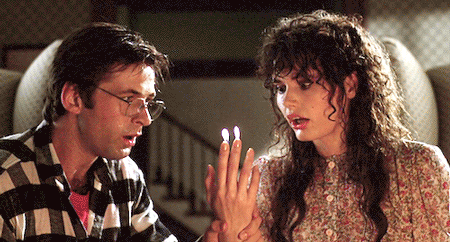
Beetlejuice (1988)
I was the most extra Hot Topic poster child from ages 14-17. Lots of sarcastic black t-shirts, lots of chains on my pants. The first movie my parents ever took me to was The Nightmare Before Christmas when I was almost a year old (my mother swears I was a quiet baby) and I grew up with that and all of Tim Burton’s other films in my house even though my mother gets weirded out by any stop motion that isn’t Wallace & Gromit. So, of course, Lydia Deetz was my hero growing up. I, too, was strange and unusual and very obsessed with death. The older I get, though, the more I connect with the Maitlands. I, too, want to spend eternity sprucing up my house and making it perfect on a perpetual honeymoon and enjoy my privacy.

The Life Aquatic with Steve Zissou (2004)
I made a huge move across states to my hometown right before eighth grade. Growing up with a deploying dad, my mom was a pro at putting down roots and becoming familiar with a new place. We went thrifting, we borrowed books, we rented movies. Blockbuster had a sale bin, and this was sitting on top. This movie put me on a Wes Anderson path before I even knew who he was, and I grew to appreciate this as more than just a security blanket. This is Wes, bare and shameless, all daddy issues and exotic locales and stunt casting and incredible soundtrack. I still cry every time.
7 notes
·
View notes
Text
THE WONDER SHOW
1938-1939

“The Wonder Show” radio program was so named because it was sponsored by Wonder Bread, which at the time was made by Continental Baking Company, who also made Hostess Cakes. Wonder Bread is a brand of bread which originated in the United States in 1921 and was one of the first to be sold pre-sliced nationwide in 1930. This led to the popular phrase "the greatest thing since sliced bread". The brand is currently owned by Flowers Foods in the United States.
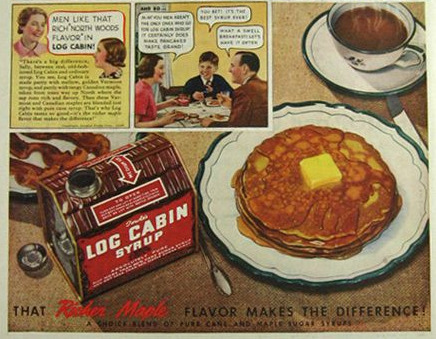
Before becoming “The Wonder Show” it was previously known as “Log Cabin Jamboree”, sponsored by Log Cabin Syrup. Like “The Wonder Show” “Log Cabin Jamboree” was helmed by Jack Haley, but without his ‘wonder woman’ Lucille Ball and ‘Wonderful’ announcer Gale Gordon.
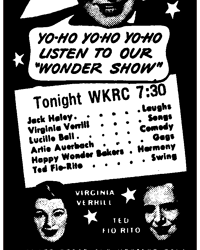
It began broadcasting on Friday, October 14, 1938, at 7:30pm and aired its final broadcast on April 7, 1939.
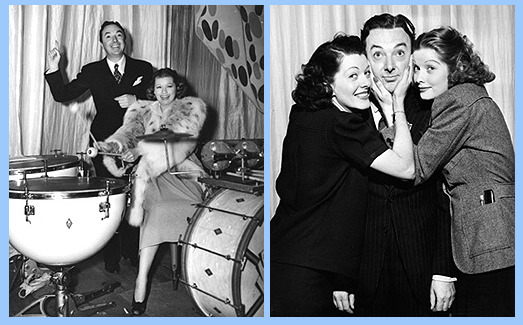
It was hosted by Jack Haley, best remembered as the Tin Man in the The Wizard of Oz. Two weeks after “The Wonder Show” went on the air, Fox told Haley they were loaning him out to MGM, who needed a last-minute replacement for Buddy Ebsen in The Wizard of Oz. Ebsen, originally cast as the Tin Man, had been hospitalized with an allergic reaction to the aluminum-based make-up, and Metro was forced to replace him. For the next several months, Haley found himself filming an epic MGM fantasy musical by day, and working with his radio writers by night. He finished his scenes in the film in mid-January 1939 and celebrated by incorporating a Wizard of Oz sketch into the January 20th episode (#15) of “The Wonder Show.”
"That was quite a winter. By the time we did the show Friday night, I was physically exhausted. Emotionally, however, I was very satisfied. I loved doing that radio show."
Regular cast included singer Virginia Verrill (above with Haley and Lucy), Lucille Ball, comedian Artie Auerbach, and Ted Fio Rita and His Orchestra. Gale Gordon was the announcer. While many believed that Gordon and Ball’s association only went back as far as 1948, “The Wonder Show” deepens that relationship by a decade.

Lucy spent much of 1937-38 radio season as a regular on Phil Baker's “Gulf Headliner” series on CBS. Lucy reportedly enjoyed doing "The Wonder Show”. She credited it, along with her other early radio appearances, for helping her with her acting career.
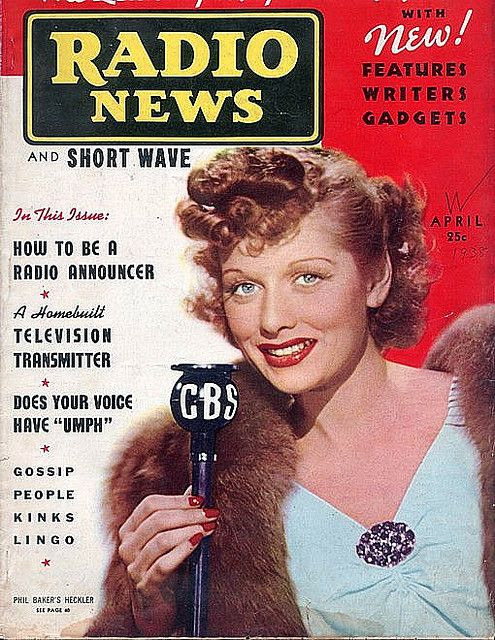
"[Radio] gave me a name in the trade as a good feminine foil. I could flip a comedy line, which a lot of actresses couldn't do. In radio I couldn't depend upon props or costumes or makeup; I had to rely on timing and tone of voice for comic effects, and this was invaluable training."

At the time Gordon was 32 years old, recently married and had just starting to grow his trademark mustache. He was in such demand that he often did two or more radio shows in a day.
"Luckily, the studios were nestled along Sunset Boulevard or in a nearby theater, so we could shuttle rather quickly back and forth from one broadcast to another."
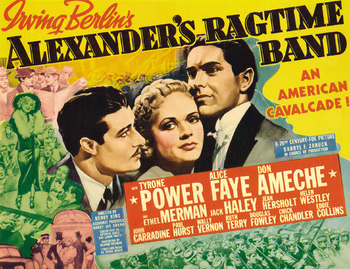
During the first episode of “The Wonder Show”, Haley spoke briefly about his current movie release, Alexander's Ragtime Band, starring Tyrone Power, Alice Faye, Don Ameche, and Ethel Merman. He also mentioned Lucy's RKO films Room Service, The Affairs of Annabel, and Having Wonderful Time.
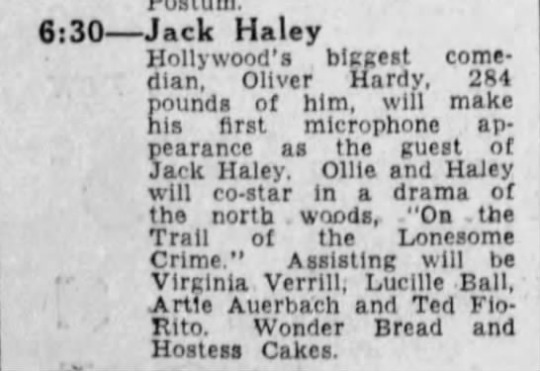
Other weekly guests included Dizzy Dean, Joan Bennett, Reginald Gardiner, and Oliver Hardy.
EPISODES
Episode #1 - October 14, 1938 - “Pepe Sacola Haley, Jewel Thief” [Premiere; introduces a series of weekly Haley Family Album sketches]
Episode #2 - October 21, 1938 - “Pony Bill Haley” [A forum entitled "Should a woman have a career?" Lucille Ball explored this theme on “I Love Lucy” in “Job Switching.”]
Episode #3 - October 28, 1938 - “Little Lord Fauntleroy Haley" [pre-empted in some areas for an address by President Roosevelt]
Episode #4 - November 4, 1938 - “Gaucho Haley”
Episode #5 - November 11, 1938 - “Julius Caesar Haley”
Episode #6 - November 18, 1938 - “Elephant Boy Haley”
Episode #7 - November 25, 1938 - “Sergeant O'Haley of the Northwest Mounted Police”
Episode #8 - December 2, 1938 - “The Hatfields and The McHaleys”
Episode #9 - December 9, 1938 - “Super Detective 'Wonder' Haley - The Secrets of the French Police or Where Did They Get Those Post Cards?”
Episode #10 - December 16, 1938 - “Colonel Jack Haley and Sea Cookie”
Episode #11 - December 23, 1938 - “Super Sleuth 'Wonder' Haley - Murder in the Sweater Department or Much Ado About Knitting” [The subtitle “Much Ado About Knitting” was later used on “I Love Lucy” in “Lucy Writes A Play”]
Episode #12 - December 30, 1938 - “Francois Villon Haley, The Pugnacious Poet of Paris”
Episode #13 - January 6, 1939 - “Captain Haley of the Marines”
Episode #14 - January 13, 1939 - “Haunted House” [Friday the 13th]
Episode #15 - January 20, 1939 - “Jack Haley the Clown: The Murder of the Bearded Lady”
Episode #16 - January 27, 1939 - “Jesse James Haley”
Episode #17 - February 3, 1939 - “The Czar of Russia”
Episode #18 - February 10, 1939 - “Gone With the American Revolution” [Lind Hayes, impersonator, imitates the voices of Lionel Barrymore, Gary Cooper, Fred Allen and others.]
Episode #19 - February 17, 1939 [Lucille Ball introduces a new character; Jack Haley's tough, sassy little niece, a sort of "Dead End Girl".]
Episode #20 - February 24, 1939 - “The Amazing Dr Jitterbug or A Scar Is Born” [A hunting lodge-themed episode]
Episode #21 - March 3, 1939 - “The Amazing Dr Jitterbug or A Scar Is Born” [Chicago Cubs baseball player Dizzy Dean guest stars]
Episode #22 - March 10, 1939 - [Actress Joan Bennett guest stars]
Episode #23 - March 17, 1939 - [Comedian Hugh Herbert guest stars]
Episode #24 - March 24, 1939 - “Paul Revere Haley” [Actor Reginald Gardiner guest stars; Lucille Ball later played Mrs. Paul Revere on “The Jack Benny Program” in 1964.]
Episode #25 - March 31, 1939 -“On the Trail of the Lonesome Crime” [Oliver Hardy guest stars. On a 1966 episode of “The Lucy Show” Gale Gordon - as Mr. Mooney - was hypnotized into being Oliver Hardy to Lucy’s Stan Laurel.]
Episode #26 - April 7, 1939 - “Local Boy Makes Good” [series finale]
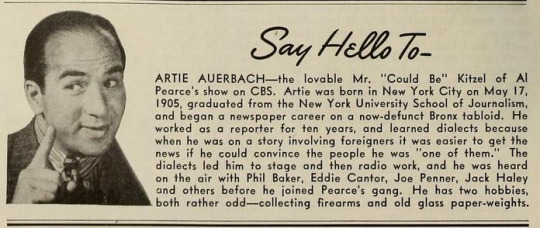
On March 29, 1938, Ed Sullivan’s newspaper column announced that Artie Auerbach would be marrying young actress Cleo Manning (later Cleo Morgan then Smith). Manning made her screen debut being kissed by Clark Gable in the 1941 film Honky Tonk. Cleo Manning's cousin, Lucille Ball, interceded in the marriage, because Manning was not of age. They were at the license bureau when Ball persuaded them to wait. Auerbach and Manning were married at a later date. Cleo was producer of “Here’s Lucy” and “Lucy in London”.

Also in 1938, Lucy’s friend and fellow film actress Ann Sothern was also promoting Wonder Bread. Sothern was appearing in a Wonder Bread-sponsored radio show titled “Pretty Kitty Kelly” on CBS.

After “The Wonder Show” finished on April 7, 1939, Lucy was still cranking out films doing more than 25 screen appearances before being cast as Liz Cooper in radio’s “My Favorite Husband” (also starring Gale Gordon), the series that led to “I Love Lucy” and her place in television history. Although she initially wanted to take Gordon with her to television as a regular, his schedule and salary demands made it impossible so William Frawley was cast instead. Although he made several guest appearances on Ball’s shows, it wasn’t until 1963 that the two became a team again.
[The author is indebted to The Digital Deli Too for their “Wonder Show” web page as well as Thomas J. Watson’s Lucy Fan webpage about “The Wonder Show.”]
#The Wonder Show#Wonder Bread#Jack Haley#Radio#Lucille Ball#Gale Gordon#Artie Auerbach#Virginia Verrill#Hostess Cupcakes#Phil Baker#Oliver Hardy#Joan Bennett#Ann Sothern#Cleo Morgan#Alexander's Ragtime Band#Reginald Gardiner#Dizzy Dean#The Wizard of Oz#Ted Fio Rita#CBS
7 notes
·
View notes
Text
Hamlet (1969)
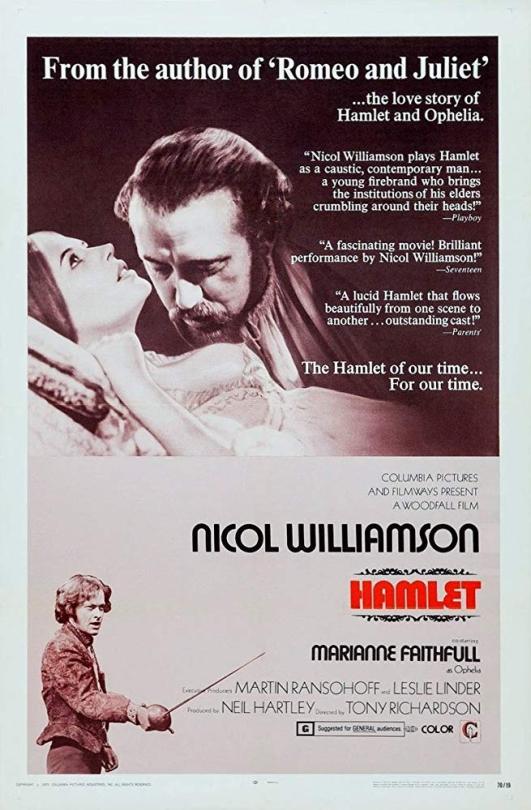
Directed by Tony Richardson
Written by William Shakespeare with an assist from Tony Richardson
Music by Patrick Gowers
Country: United Kingdom
Language: English
Running Time: 117 mins
CAST
Nicol Williamson as Hamlet
Judy Parfitt as Gertrude
Anthony Hopkins as Claudius
Marianne Faithfull as Ophelia
Mark Dignam as Polonius
Michael Pennington as Laertes
Gordon Jackson as Horatio
Ben Aris as Rosencrantz
Clive Graham as Guildenstern
Peter Gale as Osric
Roger Livesey as First Player / Gravedigger
John J. Carney as Player King (as John Carney)
Richard Everett as Player Queen
Robin Chadwick as Francisco
Ian Collier as Priest
Michael Elphick as Captain
David Griffith as Messenger (as Mark Griffith)
Anjelica Huston as Court Lady
Bill Jarvis as Courtier
Roger Lloyd Pack as Reynaldo (as Roger Lloyd-Pack)
John Railton as 1st Sailor
John Trenaman as Barnardo
Jennifer Tudor as Court lady
(All images taken from the Internet. Sorry about that.)
Like many English I have happily accepted every plaudit thrown at the work of William Shakespeare as though I myself had a hand in writing it, while never actually bothering to expose myself to any of it, outside of school anyway. It’s all a bit too much like hard work, you know, got other things to do. This nose won’t pick itself. But in the interests of satiating a mid-life crisis hunger for self-improvement I girded my withered loins and prepared to chuck myself unto the breech of the Bard of Avon’s oeuvre. Being a hesitant creature by nature, I decided to afford myself of the water wings provided by onscreen Shakespeare performed by actors I like. I really like Nicol Williamson (Excalibur (1981), The Reckoning (1969), The Seven Per-Cent Solution (1976) etc) So, here we are then with someone (moi) who is far too late to the party rocking up to tell you about Nicol Williamson’s Hamlet (1969). It’s actually Tony Richardson’s Hamlet starring Nicol Williamson, but in the theatre (darling) to get bums on seats the star gets top billing. In movies this would result in Mark Hamill’s Star Wars, so they don’t do that. And I can see their point because although I know who both Tony Richardson and Nicol Williamson are, I did only come for Nicol Williamson.

No offense to Tony Richardson, mind. Prior to Hamlet he had directed many movies including the cinematic landmarks (deep breath, now) Look Back in Anger (1959), The Entertainer (1960), A Taste of Honey (1961), The Loneliness of the Long Distance Runner (1962), Tom Jones (1963) and The Charge of the Light Brigade (1968). (phew!) Other movies exist in between those, but those are the career makers; most people get one career maker, Richardson had a fistful. Back then though, people obviously had a lot of time on their hands for as well as being a movie director, Richardson co-founded the influential English Stage Company and directed Shakespeare in Stratford-upon-Avon. Crucially though, he also found time to co-found Woodfall Film Productions. Hamlet is of course written by Shakespeare and this movie is a Woodfall Films production. So a Hamlet movie is well within Richardson’s comfort zone. But that doesn’t mean it wasn’t hard work and it doesn’t mean that the fact it works should be taken for granted. Nothing should ever be taken for granted in the world of film. After all Ridley Scott directed Alien (1979) but Ridley Scott also directed Prometheus (2012). And Alien: Covenant (2017). (Could someone please take the Alien franchise off Ridley Scott? Thanks awfully.)
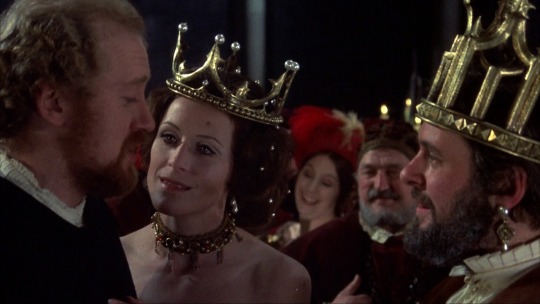
Basically, Hamlet is a good film, well, actually it’s more precisely a really good filmed performance of Hamlet rather than a good film. It’s pretty obvious the budget was what a generous person might term, um, constrained. There’s a lot of stone arches in heavy shadow standing in for Elsinore castle. A lot. Other than this, uh, minimalism it's a pretty meat and potatoes production; with just a soupçon of suggested incest between Ophelia and Laertes and emphasis on generational conflict to add some '60s spice. It's basically Hamlet as written; it's not set on a Glasgow sink estate or in a cupboard in Hitler's bunker. Fret not though, Richardson knows what he’s doing, because the big difference between a performance of Hamlet and a filmed performance of Hamlet is you can get right in there with the camera. And that’s cheap as chips, whereas building Elsinore castle and showing the ghost are not an option. Brilliantly and counter intuitively Richardson takes the opportunity of filming Shakespeare to go not large, not cinematically widescreen in scope, but instead to go small.
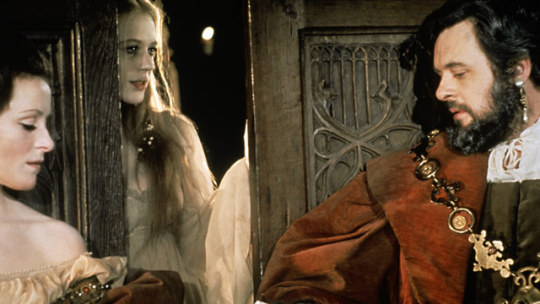
Yes! Nicol Williamson can look you right in the eye as he moodily wonders whether he should off himself. No matter how much your seat cost in the theatre you can’t get that. And every seat in the cinema (or your house) costs the same, so it’s also a great leveller; everyone gets the same view. A ruddy good view at that. You can practically see the pleased gleam in the actors’ eyes as they launch into some riff that has (quite rightly) become part of the linguistic furniture of the world entire. “Oh, sure, you know this one” they seem to say “but you’ve never had it spoken directly to you, and for you alone. Tuck in! fill your boots” Imagine Elvis singing Suspicious Minds to you and you alone. Imagine is all you can do, because he died on the toilet in 1977. But you can actually have Nicol Wiliamson look you in the face and do that one about slings and arrows, even though he died in 2011 of oesophageal cancer.

But Hamlet isn’t just a one-hander, people other than Nicol Williamson are in it. And as fierily magnificent as Nicol Williamson certainly is as the truculent vengeance seeker, everyone else is great. Because, I imagine, if Tony Richardson says he’s filming Hamlet only a berk would turn him down. For there are no berks in sight in this one. One of the fun things about watching old movies of Shakespeare plays turns out to be the familiar delights secreted within the cast. Gordon Jackson, mostly familiar to me as CI5’s George Cowley in TV’s The Professionals (1977-1983) is here as Horatio, Roger Lloyd-Pack AKA Trigger from Only Fools and Horses is here as Reynaldo, Marianne Faithful is, much to my surprise here as Ophelia, and to my even greater surprise, she’s really very, very good (which will teach me to be so presumptuous), Michael Elphick of Boon (1986-1992) pops up and, hey nonny no, who is this playing Claudius, the King usurping uncle? Why, ‘tis none other than Anthony Hopkins, who has been in a couple of things I can’t quite recall right now.
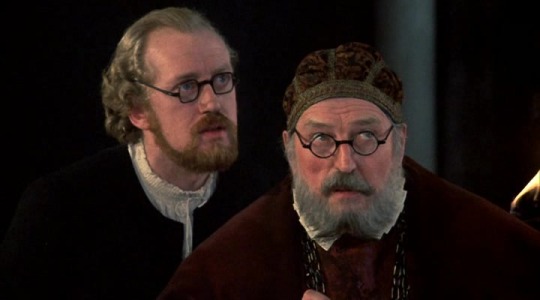
Basically there isn’t a single face onscreen who doesn’t know what they are doing. And that’s why it works as an excellent introduction to Shakespeare. They know what they are doing so while you may not catch all the language (it being somewhat less than modern) you will always catch the gist and the intent of the speech. I’d bet you’d be very surprised by how much you do actually get; you should give yourself more credit. This Shakespeare stuff was never meant for just the toffs, it was meant for you and me; people who want to wind down after work. Don’t let the buggers keep all the good stuff to themselves, yeah?
Now, obviously, the preceding was a) awful and b) not a review of Hamlet itself. I’m not entirely sure who would possess the temerity to critique Shakespeare’s Hamlet (“Shakespeare’s foreshadowing is far too blunt and the whole exercise in adolescent angst is in dire need of a car chase or some boobs to lighten things up.”) What I am saying is, if you feel the need to attempt Shakespeare then you could hardly be in better hands than those of Nicol Williamson, Tony Richardson and ITV’s Boon. Go on, give Hamlet a go. It’s what Old Bill would have wanted.
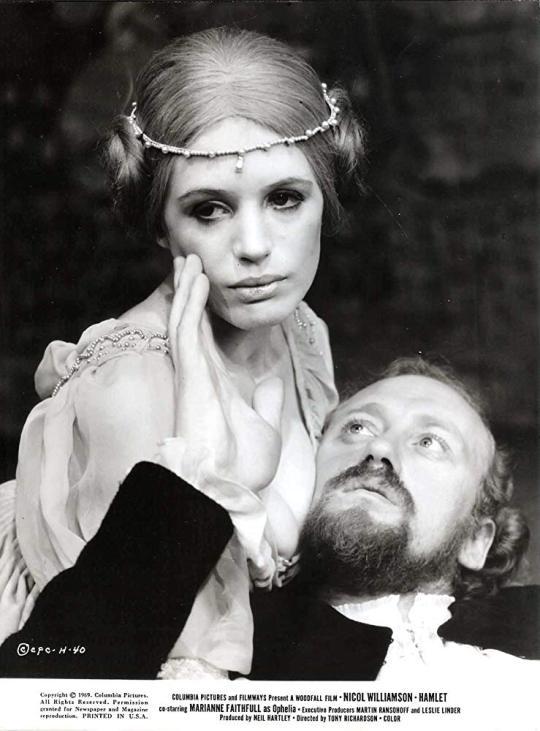
#nicol williamson#tony richardson#anthony hopkins#marianne faithfull#1969#the 1960s#shakespeare#hamlet#gordon jackson#roger lloyd-pack#michael elphick#theatre#culture#highbrow#united kingdom
28 notes
·
View notes
Text
Star Trek V: The Final Frontier (1989) Review

Spock: "I am well versed in the classics, doctor." McCoy: "Then how come you don't know 'Row row row your boat'?"
When I rewatched Star Trek III: The Search for Spock recently in order to review it, I hadn't seen it in a long time and was pleasantly surprised by how good it was. I was hoping for the same thing to happen with Star Trek V. Unfortunately, no. Big time.
This movie is awful on pretty much every level. In fact, it is so appallingly bad that we stopped watching half-way through, and I only went back and finished it alone a few days later so that I could write a complete review.
It's even hard to figure out what is the worst thing about it, because there is so much badness to choose from. Spock's messianic half brother whose existence had never been mentioned before? (Isn't a sibling coming out of nowhere a "jump the shark" moment?) The search for God, who turned out to be a cruel, petty alien? Mountain climbing as a numbingly obvious metaphor for religious seeking? Come on, people. Star Trek is so much better than this.
When something doesn't work for me, I usually list what was good about it, and try to figure out what might have made it better. I doubt that anything could have made this movie better. Instead, I kept coming up with more reasons why it sucked. In general, it was like poorly written fan fiction with juvenile humor. It ripped off Star Wars several times, with the new Enterprise falling apart like the Millennium Falcon, Nimbus III scenes that looked uncomfortably like Tatooine, and Paradise City again much like Mos Eisley. (A three-breasted cat as a stripper? Really?) Spock neck-pinching a horse was right out of Blazing Saddles, and his rocket shoes belonged in a bad episode of Flash Gordon.
Even the funnier moments didn't work and occasionally made me cringe. The camping scenes could have been cool, but were just too silly and went on too long. I especially hated the little shout-out to slash fandom when Kirk started to hug Spock and Spock said, "Please Captain, not in front of the Klingons." And Uhura's hoochie coochie moment had Dan saying, "That could very well be the stupidest moment in the entire series."
And the serious attempts at drama were just embarrassing. Sybok, the anti-Surak, rode into the city on a donkey (okay, a blue horse with horns) and wearing white, just so that we wouldn't miss the Christ symbolism. How Sybok managed to brainwash members of the crew was never satisfactorily explained. The flashback/hallucination of McCoy euthanizing his father just made me angry; you need to do some background in order to make a scene like that work. And then there was the discussion about the deeper meaning of "Row Row Row Your Boat." I can't believe I just wrote that sentence about my beloved Star Trek.
The only things I found interesting or forward-thinking were Kirk taking steps toward diplomatic ties with the Klingons, and saying that he had always believed he'd die alone. But these two little things weren't enough to make this movie palatable.
Star Trek V was William Shatner's baby; he directed and co-wrote. I'm not a fan of his, but he's a good actor, he wrote (or got credit for) an entire science fiction book series, and he was such a strong lead for the original series. His work in the previous movies was excellent, too. But given his prominent role behind the scenes, this movie did make me think. Is this how Shatner saw Star Trek, as action/adventure with fights and explosions, complemented by transparent and simplistic symbolism? Is this how Shatner saw the character of Kirk, as a stubborn super-athlete climbing a mountain alone without an anchor rope?
For me, this movie was the franchise equivalent of Superman 3, Alien 4, or Terminator Salvation. After the exceptional trilogy that preceded it, Star Trek V was an insult to the audience and a disappointment to the fans. And that's sad.
Bits and pieces:
-- Stardate: 8454.1. Nimbus III, the Planet of Galactic Peace, in the Neutral Zone; Yosemite National Park, Shaka-Ri whatever on the other side of the "boundary."
-- The music was from Star Trek: The Motion Picture, and was also used as the theme for Star Trek: The Next Generation.
-- Lawrence Luckinbill actually did a decent job as Sybok. Not his fault that the movie was so bad. The wonderful David Warner got very little to do; maybe that's why they gave him a slightly better part in Star Trek VI.
-- They didn't quite tell us what happened to Sybok, but the visuals reminded me of the terrible original series episode, "The Alternative Factor."
-- Scotty and Uhura as a couple. Noooooo. Please, no.
-- I remember many discussions about Roddenberry saying Star Trek V wasn't "canon." Apparently, though, he did that a lot.
-- The lounge, sort of Ten Forward-like, had a decorative ship's wheel standing alone in front of the viewport. I'm assuming it was so that the actors had something to stand around while doing dialogue.
Quotes:
Spock: "Perhaps 'because it is there' is not sufficient reason for climbing a mountain."
Kirk: "Bourbon and beans. An explosive combination." And I thought, thank god they didn't do the obvious Blazing Saddles scene.
Spock: "Were we having a good time?" McCoy: "I liked him better before he died."
Kirk: "I could use a shower." Spock: "Yes."
One out of four absolutely pointless ship wheels.
Billie Doux loves good television and spends way too much time writing about it.
#Star Trek#Star trek V#Star Trek V: The Final Frontier#James T. Kirk#Spock#Leonard McCoy#Star Trek Reviews#Doux Reviews#Movie Reviews
2 notes
·
View notes
Text
Two Films That Don’t Exist
Apologies for not posting much of interest today. I was kinda sidetracked by Twitter drama I'm not directly involved in, but still hit a lot of my angst points. But, enough with that, on to happier things
Namely, things that don't exist! More specifically, films that don't exist! I got of 'em, ready to go, sorta, free to use as if they were public domain; under a CC0 License (Tho credit is nice) in whatever you wish!
Hands Of Judgement- Alledgedly started from a bet by 50s effects artist Al Orton to a drive-in producer about the latest piece of crap he had to work with that “I could make a better monster than you chumps with just my two bare hands,” Hands of Judgement is indeed an unusual hybrid for its period. Namely: A horror/western piece.
Done using recycled sets from the other Westerns of this period, Hands of Judgement is the story of a crime-ridden old-western town attacked by a pair of ghostly hands, done through a combination of Bert I Gordon-type editing of human hands onto live footage and the use of miniature models for the hand-actor to actually interact with; with the actor's hands hidden via clever framing.
The model's a standard whodunnit, with the murder of the town's sheriff leading to his ghastly return as a pair of disembodied hands, as unscrupulous individuals in the town are picked off one by one as the new sherrif and his love interest try to find out who did it.
The characters are relatively stock for this period, complete with an evil railroad baron who turns out to be a land-grabbing mastermind and the true murderer, though the implication that the love interest may be a sex worker is interesting at least; albeit it seems more intended for exploitation purposes rather than for progressivism’s sake.
Orton was a first time director, and it shows in terms of his relative shakiness in terms of pacing and framing; more often sins of over rather than under ambition that make it odd to watch with the otherwise boilerplate plot and editing.
The effects though are still fascinating, having aged far better than many of its contemporaries even if they still have their flaws in spots. The manifestation of a gun by the hands in the climax seems to have been an act of necessity to allow them to stay in the scene with the actors the whole time and yet still pose a threat, but it is undeniably a striking vision
Though, there is a rumor that the buildings in the miniature shots were made from parts of Marx miniature sets, which Orton has said in the past is only “partially” true, though he has refused to elaborate.
March Of The Puppetmaster- Made under the notorious producer Ronnie Sharikov, the film was essentially designed as a commission for a ballet troupe that had essentially hired Ronnie’s company to make a film as essentially a feature-length promotion.
Ronnie, of course, decided to do it as cheaply as possible, re-using the “Hell House” he’d used for most of his other productions; which he only bought because it was barely safe enough to avoid condemnability, and hiring some kid right out of film school to work on it.
Of course, that kid was the young Walton Buckner; later to become famous for his work on the legendary Helltel franchise; and he knew what to do with a tiny budget.
The film itself was a creative marvel, about a woman who stumbles into a house along with an unfortunate drifter durring a torrential rain that seemingly never ends; where mysterious puppets seem to wait on her hand and foot; with a mysterious host who only appears as a voice seeming to have a strange agenda.
The “puppets” of course are the ballet troupe in simple blank; featureless masks, with the film often utilizing their routines re-purposed to show paralells with the lives of the characters. Aside from that, the effects are relatively light. A simple makeup effect is used for the scene where the drifter pulls out a puppet string from his arm, and the disquieting “Rat King” mask of the film’s final villain was made by the director himself, allegedly brought to the set one day with zero explaination.
As much as the budget was basically nothing, the director worked around it with creative and breathtaking cinematography, with the many dialogue-less shots due to the difficulty of wiring for sound for the shots he wanted and the usage of classical music to avoid the costs of writing a score creating a haunting feeling that many have compared to the similar Carnival Of Souls.
The final scene in the theater room; where the heroes confront the Rat King in front of his artifact The Black Cross which is slowly turning them into puppets; is especially notable due to how well it turned out for the fact that every take was essentially done in a singular night, after the crew had broken in illegally. Though, Walton never admitted it, it has been corroborated by the cast, and there is no way Sharikov would have ever approved that additional budgetary expendature.
The film was a hit; at least as far as drive-in exploitation goes; but beyond his original production fee Walton never got paid a dime. But, Walton never regretted it, despite his experiences with Ronnie being allegedly miserable, as it put him in the eye of other producers to get better films made; and he did like the final product...
Well, there’s only two of ‘em, I’d planned for three but these took a lot longer than I thought. Tho, there’s proooooobably gonna be a followup this week, so...
30 notes
·
View notes
Text
Smokey brand Movie Reviews: I Am Vengeance
The Batman finally released this week and i for sure was going to see it. This had incredibly interesting casting, f*cking Edward Cullen was picked by the studio to be Bats, among historic levels of rumored troubles. From COVID shut downs to ducked work outs to sordid inter-actor relationships; This f*cking thing was either going to be a masterpiece or a whole ass train wreck. Well, it dropped yesterday, i got to see it today, and i got thoughts.
The Good
Matt Reeves knows how to make a f*cking movie, man. This dude is a solid director and a real visionary. I’ve been a fan of this dude since Cloverfield and have watched his career progress ever since. Mans is real good at his job. Dude earned his stripes with the Apes trilogy, and those were very good, but he also steered the US remake of Let the Right One In; Let Me In. That film has a in common with this one but I'll get to that later. Right now, i have to give all credit to Reeves for this film. Dude was in top form as far as film making.
This film is very f*cking detailed. There are just little touches, here and there, that really drive home the meticulous nature Reeves has for his films. Take that eye makeup for instance. Every Batman uses it to fill the gaps in his cowl but you never see it when they take the thing off. Burton was notirous for this sh*t. Not Reeves. No, BatPatts has smeared mascara for a third of this film and I ratehr enjoyed that.
The cinematography is f*cking incredible in this thing. It’s not the best I've seen, that definitely belongs to Nolan’s films, but it’s a very close second. There are scenes in this thing that are absolute masterpieces, whole ass shots that can be hung in museums. All credit to Greig Fraser because, f*ck, is this movie gorgeous!
The overall look of this movie is pure Batman. From the costumes, to the city, to people, to overall tension that is Gotham; This film nailed that look. It’s like Reeves and his team pulled this aesthetic directly from the No Man’s Land or Joker War story arc from the books. Sh*t feels more like Batman, more like Gotham, than any other Bat-flick aside from the Burton takes.
I also have to give a nod to the new theme. This sh*t hits hard. It's got nothing on the Elfman classic but it's definitely giving Zimmer a run for his money. They lean on it real heavy but it's a legit banger so I didn't mind at all.
This is easily the best version of a Long Halloween adaption I've seen so far. It hits all the necessary beats, minus the rogues cameos, and does something very interesting with it. As a comic fan, as a fanboy of that narrative, i appreciated the respect forgiven to that story. It was clear Reeves read that sh*t and was able to properly translate it into his Bat-story. The writing is pretty solid, even if it is a story a fan would be well familiar with. A lot of people are saying it’s a bit derivative but how can it not be? Everyone always adapts the same five or six stories from the Batman Top Ten. We haven’t had an original take on a Bat-story since f*cking Schumacher.
But that Batmobile, tho! In all seriousness, that car was f*cking amazing. It’s easily my favorite version and is definitely a character into itself. When the promo shot of it were released, i knew i would love it but to see it in action? Yo. That extended chase with Penguin was some of the best car action caught on film and that’s not me exaggerating.
Speaking of action, i have to give a nod to the fight choreography in this thing. It feels a lot like how i think a proper Batman would fight. It feels a lot like how Rocksteady had Batman counter punch in their Arkham games but FAR more brutal. Bats was busting heads throughout this thing and i loved every second of it. It’s not John Wick or anything but it’s easily the best combat to make it to a Bat-flick so far.
I have to admit, i was a little sus on the casting choices but they all worked out fairly well. Jeffrey Wright is a great Jim Gordon and i look forward to seeing him in the Gotham show slated for HBO max release and Dano is a fantastic Zodiac-inspired Riddler. Andy Serkis was a serviceable Alfred, though he killed what material he was given, and John Turturro was a relatively sleazy Carmine Falcone. I was on the fence about Zoe Kravitz getting the Catwoman nod but she was surprisingly decent in the role. I thought she embodied Selena way more than Hathaway, something Reeves definitely has over Nolan, but ma can’t touch Pfeifer. Based on just Kravitz portraying Selena from TLH, she’s fantastic. F*cking untouchable. Solid cast was solid but there were three absolute standouts; Pattinson and Farrell.
Robert Pattinson is a great f*cking Batman, i can’t even argue that. I’m to going to sit here and tell you he’s Conroy levels of perfect but he’s probably the best or second best live action Bats we’ve gotten so far. I like his version of Batman more than Affleck’s, for sure, but I'm having a hard time placing him ahead of Bale and i think he just edges out Keaton. Dude embodies the cowl but when he’s out of it? Not so much. I think this movie is the origin of the “Bruce Wayne” persona because some stuff happens at the end which kind of points in that direction but, overall, BatPatts is the engine that drives this film and he’s running on that premium gas.
Now, as much as i enjoyed BatPatts, Colin Farrell’s Penguin is f*cking exceptional! Mans stole every goddamn scene he waddled into. Oz, as he’s so affectionately called, had this slimy smarm, this gangster swagger that carried him throughout this entire film. Farrell channeled his inner Goodfella and really delivered a Penguin that rings true to the Iceberg Lounge take of the character but turned up to eleven. I can’t see him being a big bad but i can see him being a recurring nuisance or uneasy ally going forward. I can’t wait to see what he does in the Gotham sin-off.
The pacing in this film is exceptional. This f*cking thing is three hours long, more if you count previews, but it never really felt like that. It gets you right into the plot and never let's you rest. Now, I say that being a total Marvel shill. The MCU is absolutely known for dropping two and a half hour long epics. Hell, the three box office busters, Infinity War, Endgame, and No Way Home, have an average run time of two hours and thirty-nine minutes so I might be desensitized to films of this length.
The Meh
You don’t get enough of anyone in this film outside of Batman, Selena, and Gordon. Dano is great as Riddler but then you barely see the guy. Farrell kills it as Penguin but then you barely see the guy. Andy Serkis is doing a militant Alfred who actually trained Bruce? Can we see some more of that, please? Nope, he’s barely in the goddamn film. Carmine Falcone is an integral part of the plot but you barely f*cking see the guy! I get that this movie is called The Batman and is about the Batman, but what the f*ck, dude? Why filled this movie with suck compelling characters, and then underutilized ninety percent of them?? What the f*ck?!
I think Reeves went a little too heavy into the “grounded-gritty-adaption” with this thing. Everything feels really DIY in this flick. There’s a scene where Batman glides away and dude is just in a wing suit. Like, you expect Batman to whip out that glider cape thing like in Returns and TDK but nope! Base jumping and a parachute. This sh*t works with things like the suit and the car but other aspects? Not so much. I’m not mad, it fits the tone Reeves wanted, but, like, comic movie, man. Cat can stand to have a bit more of that comic element in these films going forward.
The Bad
You’ve seen this movie before. You’ve been told this story before. The Batman does nothing new but it’s not a derivative rehash either. This thing feels like Matt Reeves copied Nolan’s homework but changed a few answers so it doesn’t look suspicious when their test are graded. Dano’s Riddler is straight up Ledger’s Joker. They are the same character and even have damn near the same plan. seriously, if you squint at certain times, you can kind of see that tell-tale Glasgow just under Dano’s mask. And, while we are on the subject of the Joker...
This version sucks. Dude is only in one scene but from what I've seen, and moreso from what I've heard, I'm disappointed. Barry Keoghan is slated to put on the grease pain this time so i was kind of hype. Dude was one of the two things i enjoyed about Eternals and he definitely looks the part. Imagine my utter despondence. Reeves might do something special with the character in the future and Keoghan has the ability to deliver strong but, as far as first impressions, i am left wanting.
The Verdict
The Batman is okay. Pattinson does a great job and Farrell steals the show but the cast, as a whole, is really good. Dano is unarguably the best live action Riddler to date, even if it’s nowhere near comic accurate but you have Zoe Kravitz for that. Indeed, Kravitz is easily the most comic accurate Catwoman and it’s always a pleasure seeing Jeffrey Wright or Andy Serkis in anything. Matt Reeves really directs the hell out of this film with a crystal clear vision for what his Bat-world should look like. There is a lot of good in this thing but a lot of meh, too. It feels like you never get enough of anyone other than Batman and forget about Bruce Wayne. Forget about more Penguin, Falcone, and Alfred, too. More than anything, watching this felt like watching The Dark Knight through a Rocksteady filter. It was like Christopher Nolan directed an Arkham City adaption. Don't misunderstand me, movie is dope and gets the high recommend but I think it's being a little over hyped Matt Reeves has made a great noir detective thriller, but he has made just an okay Bat-film. A lot of people are saying this thing is better than The Dark Knight but it’ not. It’s up there but i would say TDK and Returns are better Bat-films than this one. Still, it’s worth a watch because, on it’s own, it’s a solid f*cking movie. And that car is f*cking fantastic!
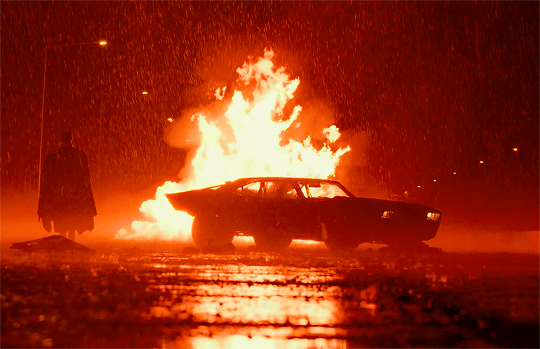
0 notes
Text
The Zookeeper- Ryan & Susie in Conversation
Susie: So Ryan, what do you remember about the Zookeeper two weeks later? What immediately jumps out to you about it?
Ryan: “Show her your puddin’ cup!” jumps out at me.
S: How did I forget about that part? I was thinking about the sad gorilla cake. My number one thing about that movie was that heinous gorilla costume. It was on my top five list of topics “bad gorilla costume” and Kevin James just sitting in the gorilla pen talking to the gorilla. Am I remembering wrong or was that half of the movie?
R: There was a lot of time spent in the gorilla pen. I feel like we have hit both extremes of animal movies. We hit the animal movie where they were making the animals do too many things that ended up being too much and too creepy, like dancing and singing and CGI wiggling… stuff...
S: Wearing pants
R: Yes! Wearing pants and stuff. So, we hit that extreme and then in The Zookeeper, we sort of hit the extreme where animals were just acting like boring people.
S: Like standing around A LOT, like a ton of animal loitering. The zoo would close, the animals would loiter. They’d confer about Kevin James, decide to take action but their action was to circle around Kevin James.
R: Yeah. You know what is funny? There were no animal-related hijinx, other than the gorilla going to TGI Friday’s which is also really boring.
S: It’s truly boring but when I tell you there are so many clips of it on Youtube. People love that scene where he is the van listening to the Apple Bottom Jeans song with the gorilla. I was searching…I have to say there are parts of The Zookeeper that I like. I have to say that Rosario Dawson was a champ throughout this film. I don’t feel like we have seen, to date, sort of Kevin James love interest that has been as game as she has for the ridiculous hijinks and pratfalls. She made the most sense so far.
R: Yeah. She was good, actually, and I think because they worked together and sort of had a friendship through work, when they got together, you weren’t like, “Oh, how did that happen?”
S: Like Paul Blart and the hair extensions woman.
R: Yeah. No. That was weird. That was not appropriate.
S: So forced and then Salma Hayek who seemed to genuinely hate his character in Here Comes the Boom. Or not even hate but sort of..but yea, revile. She definitely wasn’t a fan.
R: Definitely not respect. I do not know why she ended up jumping on that train, but I have a feeling it was nothing to do with his personality.
S: It was because he saved just the music teacher’s job. At the end of the movie, the shocking part is… not to talk about Here Comes the Boom again, but I could, forever… it’s not saving the school’s budget, it’s just saving a teacher. In the same way, that in the Zookeeper he stops selling cars to save the gorilla? Is that right? The gorilla, there’s nothing even happening with the gorilla? That was sort of a red herring?The one guy bullied the gorilla but nothing ever came of it?
R: Well, the one guy bullied the gorilla, which I feel like could have been solved by reporting that guy to their boss.
S: Instead of just kicking him
R: Yeah, he just sort of killed that guy, I guess. I don’t know.
S: He got murdered
R: Yeah, that guy got murdered. But [Griffon] knew about it before then. I feel like if [Griffon said something along the lines of, “I suspect [Shane] is abusing the gorilla. I think we should put a camera in there.” That probably would have solved that problem. I feel like he never went to Step A before he went to killing that guy.
S: And also, it’s like the zoo wanted to punish the gorilla, when again, it’s an animal, it’s a wild animal, not even a domesticated animal. So they were like… he kinda, I don’t even think he bit the guy, so he doesn’t get a nice cage anymore, we put him in a shitty cage. This is not a moral thing that the zoo is doing. So that is my other question, why is no one ever at the zoo? Did they spend all the money on wedding extras and TGIFridays extras. But that zoo feels closed all of the time. No one is there but the employees and that’s why the animals loiter so much.
R: That’s true. There is definitely a financial crisis happening with that zoo.
S: And we never figured out what city it was in, we conjectured San Francisco
R: Didn’t we eventually think they were in Boston?
S: Oh yea, we Googled it
R: We eventually find out it’s in Boston, and that is also the final song of the movie is [by the band] Boston.
S: I think it’s so weird to have a movie set in Boston and then not have anything Boston related at all. They could have been anywhere. They might have been anywhere. Probably filmed in Quebec.
R: I do wonder if people from Boston would recognize that zoo somehow, if it’s iconic enough that if you actually had been to the zoo in Boston, you would be like, “Oh, I know exactly where that is.”
S: I don’t even feel like we even see that much of it The pudding cup scene that you mentioned where he pisses all over the place. I feel like we’re in the pen a lot, the aforementioned gorilla pen we’re in all the time, we see the eagles, we see Rosario Dawson’s lab but I would be hard pressed to tell you more of that zzo. I can’t even placed in the geography of the zoo where the engagement party was.
R: It also seemed like that zoo was just one very small area. It felt like everything was very clos to everything else
S: Basically the animals were stacked somehow.
R: This was a strange movie. I feel like we were supposed to think that Paul Blart was very committed and saving the animals--
S: Paul Blart? I love that this is basically Paul Blart, reconfigured, reconstituted
R: What is his name in the movie, again? It begins with a “G.” He’s got a strange name.
S: Gordon? I don’t remember
R: No, it’s not Gordon. I’ll look it up. I think it is definitely worth knowing his name because it is so odd.
S: I feel like I can never hold on to the names of Kevin James’s characters because it’s always shades of Kevin James. I’ve started talking about Kevin James in casual conversation at this point. Where I say things like “I think Kevin James is really happy with his life.” And different aspects of his acting.
R: I feel like he does have his shit together. *frantically typing and having computer trouble*
S: In the bloopers in the credits where he just, I guess it was in between takes, he just turns to the camera and says all of America hates me right now. I think its funny to think about, Adam Sandler is so mad that people don’t like his movies. Kevin James knows and doesn’t give a fuck. And it reminds me of when Tyler Perry was on Black AF and he’s talking about how people hate his movies and he’s like guess what, I sell a lot of tickets and I’m making movies that are true to my heart. If people don’t like that then fuck that because this is what I’m doing. And that’s why they’re all over the place because Kevin James is a complicated man.
R: Well, I think, like Tyler Perry-- I am actually glad you brought up his name because now I am enjoying this connection-- I feel like you can either relate to it or you can’t. If you can relate to Tyler Perry’s movies, then they’re funny. You’re like, “Yes. I get that. I enjoy this. This feels real to me.” I feel like Kevin James is a little bit like that, too. It’s easy to watch it and go, “Who would ever watch this?” But then when you actually think about it, it’s like-- no-- this is probably funny if you find something relatable in this situation.
R: I guess the running joke is that Kevin James is a squat, fat guy who is extremely dorky and awkward and falls in love with every woman he meets and in every movie, he is doomed to be that person, and if that is what you feel like in your life, it is probably funny to watch it.
S: He’s a millionaire so it’s the total bright side of that. Sure he might be all these things but he’s married to a beautiful woman and has this family and life that seems pretty fulfilling and what we have learned from his shorts is he is a legitimately good actor. He could just be a good actor which I could not get over. Why don’t we see more of this? Why doesn’t this show up in his movies? Is it because the writing is so bizarre?
R: I think the writing is one of the main culprits. We watch these movies and hit those points when Kevin James is funny. The fact that we’ve seen it is proof that [the problem] is not his ability to land a joke. It’s more the script. The script is just too flat in a lot of these movies. In Zookeeper, the script was-- it was hard to grab on to why you care what is happening.
S: Yes
R: His name is Griffin, by the way.
S: Oh, o yea, it’s like a last name first name
R: It’s probably because it’s an animal name.
S: I feel the Zookeeper suffers from what most of the movies he’s in suffers from which is tonal confusion. At first we’re like ok we have this guy who loves his job, total Kevin James thing, loves rules, total Kevin James thing, and is hopelessly in love with a woman who is not going to love him back to the same degree, total Kevin James thing. But then all of a sudden of all these red pill MRA shit themes start coming in. And we’re like who is this? This is not my Kevin James. And the thing is that those parts of the film feel icky. Like that part of the film feels so much more Grown Ups than anything else we’ve seen him in. Where I’m like David Spade would someone totally do this. Like you could see this showing up on his Twitter feed like “make a woman feel bad about herself”
R: I think that is one of the things that I find most troubling about Kevin James movies. I don’t want Kevin James movies to be low key sexist or high key sexist. It’s hard to tell where on the spectrum these movies fall.
S: Because of the tonal confusion
R: Yes because of the tonal confusion. It’s a weird combination of he’s putting these women on a pedestal and sometimes he’s forming genuine relationships that you can appreciate with these women. They are always strong. They are not really vapid in these movies. These are smart capable women. These characters in the are interesting people who you are like, yes, I respect this person. And then I think where it falls apart is the way he actually gets women. That’s when it starts to become creepy. So, if you learn how to manipulate women, you can just get them?
S: There’s no seeing him stick the landing. There’s no reason that the relationship goes from kind of contentious to they’re making fun of each other and there’s no real chemistry like in Here Comes the Boom, the connection between him and Salma Hayek, I’m honestly can’t remember if they actually got together or not but I know the movie was trying to take us by the hand. And I’m like we don’t need this. This can just be about his super intense friendship with Henry Winkler, Henry Winkler’s unorthodox home life and then finding himself through MMA fighting. I don’t need this romantic relationship shoe horned in. Almost in the same way as Paul Blart, the end game in Paul Blart did not need to be a woman and then it wasn’t in the second one but they kinda wanted us to want it to be. That whole plot thread with him, the hotel manager, and the security guard, what was that? I know this isn’t Zookeeper and we keep getting off subject but I think this is relevant,
R: I’m just saying, Paul Blart had a threesome with those people. I’m throwing it out there.
S: Oh 1000%
S: He’s negging them! It makes sense that he would end up with them. I predicted this. I knew this would happen. I orchestrated the whole thing. Are we then supposed to believe that Griffin also became awakened to this sort of pick up artist technique?
R: He didn’t use it on Rosario Dawson. They actually did the opposite. They had a rip roaring good time at that wedding and that’s why they got together. I think that is why this is the most painless Kevin James romantic interest matchup because when they get together you’re like, Yeah, I get that. You got invited to this wedding as a friend. You had an awesome time. You both acted ridiculous, probably destroyed this wedding, but enjoyed yourselves, and after that, you decided to be more than friends. That is actually an understandable sequence of events.
R: The negging thing-- I think we were supposed to be made to understand that it worked on Leslie Bibb because she is a shallow gold digger and those are the only types of guys that she goes out with, specifically.
S: Ok which is a perfect transtition to why is Joe Rogan in this movie? Are they BFFs why is Joe Rogan in these fucking movies?
R: I would say I think he just likes playing a douchebag in Kevin James movies, but I don’t know. It’s hard to say.
S: I am not under the impression that he is part of the Adam Sandler cabal so we have determined that Kevin James puts his brothers and his friends in all of his films.
R: And his wife.
S: And his wife. So he is the light side to Adam Sandler’s dark side. Does that then mean, that Joe Rogan is part of the Kevin James posse? Cause I really feel like we are coming onto something here.
R: Well, they must be friends, somehow.
S: We don’t see the reoccurrence of actors in these movies unless they’re friends. Because once you’re in a Zookeeper or Here Comes the Boom, you only need to be in one of these. You can just sort of live off residuals. Unless there is a different draw, you don’t really need to be in another.
R: Here is a Joe Rogan tweet from October 11, 2012, promoting Here Comes the Boom:
https://twitter.com/joerogan/status/256578871380549633?s=20
S: So this is definitely a branding thing
R: I wonder if it started with Here Comes the Boom, where Joe Rogan was in that movie because it was an Ultimate Fighter Movie, I guess.
S: Yes
R: And then maybe they did become friends because of that and decided to do more movies after that?
S: And then Joe Rogan’s podcast only took off later like he didn’t become the podcast guy until maybe 2015.
R: So, yeah, I guess that would kind of make sense is they would come up in their careers together through Kevin James movies, in part.
S: That’s so interesting though because that puts Kevin James in the power position in his friendship with Joe Rogan.
R: Yes. I actually did find an article. If you Google, “Kevin James Joe Rogan Friendship.”
S: As I do, every night before I go to bed but go ahead and tell me.
R: I don’t know what sherdog.com is. I don’t know what it is. It’s the global authority on mixed martial arts website.
S: I’m so glad this is going to be on your web history, your browser history. John’s going to be like “Ryan, are you ok?’
R: So, this is an article from October 11, 2012, entitled “Kevin James’ Friendship with Bas Rutten, Joe Rogan, Inspired Here Comes the Boom”
S: So they were already friends then went and wrote a movie?
R: Supposedly, they interviewed Kevin James. Oh, look-- you can listen to the full interview.
Interesting
R: So, they went on Sherdog Radio Network’s Beatdown Show
S: I love these words
R: And then they asked him where he got the idea for an MMA comedy and he said It really came from Joe Rogan and I talking. I’ve always wanted to try to incorporate some mixed martial arts into a movie, and Joe and I were talking about how we could make it a comedy. It seems difficult to do without making it goofy and jokey … . The challenge was just kind of getting a blend of real comedy and real moments and also infusing that with realistic MMA.”
S: So that makes so much more sense why Here Comes the Boom was so confusing. They were trying to do a lot. I think this whole project is going to lead me to listening to a ton of Kevin James interviews to just try to figure out what was the kernel that this bizarre movie started as and how the fuck did it end up where it is. And I’m going to definitely look up what lead to the Zookeeper because if this is what led to Here Comes the Boom that means the Zookeeper was Kevin James was a at a zoo and thought what if the animals could talk and give me love advice.
R: It sounds like he and Joe Rogan are friends just because they are both comedians.
S: So Joe Rogan is big at the Comedy Store and I wonder if Kevin James used to do stand up there? Cause Joe Rogan one of THE people on the LA comedy scene. I feel like we’re going to end up writing a book about Kevin James someday.
R: I would be fine with that. Could you imagine if we actually got the opportunity to interview Kevin James?
S: I would love that. I feel like… and I’m going to take a big swing right now…he is the connective tissue that holds Hollywood together. But for real, we’re finding out that he low key has just been…and long term fans would think I’m ridiculous for saying this, I feel like he’s been kinda flying under the radar in a way that I’m unaware of. But think about how few actors get to act as long as he’s been acting. He’s been around since the early 2000s that’s like longevity stuff and it seems like he’s always trying stuff.
R: I actually wish that I had known about Here Comes the Boom before I watched Here Comes the Boom. I would love to know the conversation that sparked the Zookeeper. I wish that I was there for the making of before I saw the final product. I think if I knew more about the material beforehand, I would have a different relationship with the movie.
S: No that definitely makes sense because the thing we’re always questioning is intention. Like ok, so what exactly were we supposed to get out that scene? Or why would they have the characters do that? And I feel like from the little bit that I know about how the formulation of these things happened. They’re just trying stuff. Like we’re seeing what would now be relegated to a Youtube skit or a web series but they got to make a full Hollywood movie. Similar to Kevin Smith, being like I talked about the concept for Tusk on my podcast and then I went and made it. And it seems like Kevin James and his friends are doing that all the time. Like we were sitting around in our rich man’s houses and decided to make this film. By then he was flush with King of Queens money and Adam Sandler money so why not try some shit? And the studios keep signing off on it so he must be good money right? Or was that a Happy Madison Production?
R: I think that was a Happy Madison Production???? [EDIT: Yes, it is a Happy Madison Production.]
S: Cause that’s the other part if your best friend is going to cosign on your projects very little is risked
R: Let me see. At one point, I thought this was supposed to be a kid’s movie that their parents could watch with them.
S: Like a family film but so much of it centers around materialism and the compromise that happens when you’re with the wrong person. Even the hokey animal stuff like “show her your pudding cup” and “mark your territory”, I don’t even know how funny kids would think that was.
R: I mean, I’m trying to think back to when I was a kid, if I would have thought it was funny that he was peeing on a tree in front of actual children.
S: I think I would have felt uncomfortable because I would be like “an adult’s not supposed to do that” like stranger danger stuff.
R: One thing that struck me in the movie is how suggestible Griffin is. You could tell Griffin to do anything and he would just do it. I guess his character was like that because otherwise you wouldn’t have any jokes in the movie. So, like, he is peeing at this party. I feel like in a lot of other movies, they would create some scenario or misunderstanding that would make that happen, but in this movie, he just decided to pee at this party.
S: And the maitre d is way too understanding about it. Instead of ejecting him from the party, he’s like “hey you know have bathrooms right?” And Kevin James is like “yea” and then the subject is never revisited. And I’m sort of like that is not how that would have happened, the police would have been called. And like imagine being those other diners? So like you’re not going to kick him out? You’re just going to talk to him? Okkk
R: It also didn’t give him a private place to do that. I feel like in another movie, they would have given him a place to do that out of view and then he would have been caught, but he was just out in the open, peeing.
S: He was in the center of the restaurant, pissing in a planter. It was so, that’s the other part, that makes these movies so unbelievable. Kevin James as the main character is almost never the one acting most outrageously. Like he’s acting outrageously but so is everyone else here so it make it feel like it’s taking place in a crazy world. In the same way and I keep thinking about and I don’t know why this keeps coming up for me, the moment in Grown Ups where they’re at the water park. I’m having an issue phasing in and out of these movies at this point because they all have the same problems. But when they’re at the water park and everyone’s acting bananas. Where they have that weird scene where they sneaking onto the water slide the wrong way, and they keep going on the water slide and Steve Buscemi is there for no reason and Kevin James steals that kids milk and no one is behaving properly. So are we to believe that this is just a world where no one behaves properly or is the main characters behavior setting everyone else off like a domino effect?
R: I feel like it also diminishes some of the humor of what’s happening. I feel like if everyone thinks it’s normal to pee in a restaurant, where’s the joke?
S:I completely agree. With no juxtaposition, without a straight man, where’s the joke? It’s just like everyone acting like an asshole and I just think I’m glad I’m not there. Once the lose of decorum is normalized, it’s no longer funny. It’s just like oh, we’re in a gross out world.
0 notes
Photo

Four Feathers Times Three by Susan Doll
An example of an old-school genre known as the British imperial adventure, THE FOUR FEATHERS has been filmed at least seven times. The most well-known version was directed by Zoltan Korda in 1939, and it is currently streaming on FilmStruck. The most recent adaptation of A.E.W. Mason’s 1902 novel was directed by Shekhar Kapur and was released in 2002, a century after the novel. The best version was directed by Merian C. Cooper and Ernest B. Schoedsack in 1929.
THE FOUR FEATHERS is one of those stiff-upper-lip tales of colonialism that glorifies the British Empire. This fictionalized tale of four friends in the British army is set during the 19th century when the British thought they could control the Sudan. The failure of Governor Charles Gordon to quell the rebellion in the Sudan led to the fall of Khartoum in 1885. Three years later, the Anglo-Egyptian army routed the rebel forces led by the Mahdi, the Arab leader who had captured it. The 1888 campaign in Africa is the historical backdrop for THE FOUR FEATHERS.
The feathers of the title are a signifier of cowardice given to Harry Faversham by his three army pals after he surrenders his commission. In Korda’s film, Harry (John Clements) comes from a long line of heroic military officers, but he is more interested in poetry than the spit and polish of the army. More loyal to the Empire than to their friend, John Durrance (Ralph Richardson), Thomas Willoughby (Jack Allen) and Peter Burroughs (Donald Gray) assume Harry is a coward because he doesn’t want to play army with them. They express their disappointment by sending him the white feathers. When he tells his betrothed, Ethne Burroughs (June Duprez), his decision, she questions his honor, and a fourth feather is added to his unwanted collection. Spurned by everyone he knows, Harry ends up in the Sudan disguised as an Arab. He makes it his mission to help his comrades, earning the right to return the feathers.
All three Korda brothers worked on the 1939 version. Alexander produced; Zoltan directed; and Vincent did the production design. THE FOUR FEATHERS was part of Alexander’s trilogy of imperial adventures that also included SANDERS OF THE RIVER (’35) and THE DRUM (’38). The Kordas were born in Austria-Hungary, an empire lost in defeat after WWI. Alexander gained his reputation with films that depicted the history and traditions of England, an empire that was rapidly fading. While Alexander seemed nostalgic for Old World values associated with honor and loyalty to a crown, Zoltan held modern, leftist views on politics and race. Obviously, Alexander’s perspective dominated the films the Korda brothers made together.
The Kordas’ FOUR FEATHERS was the first sound version of the story and also the first in color. From the glorious Technicolor to the cast of thousands to the location shooting, the film had all the earmarks of a blockbuster before that term was coined. Though expensive to mount, it became an enormous box-office success. Unfortunately, in reaching for spectacle and scope, this version is shackled by a mundane, monotonous visual style dominated by long shots. There are long shots of marching soldiers, North African landscapes, more marching soldiers, battle scenes with those movie explosions that spray a lot of dirt and still more marching soldiers.
I wish I could say that the cast made up for the dull visual style. . . but I can’t. John Clements was cast as Harry Faversham, but he lacked the charisma and physical presence to pull off the character’s adventurous escapades in the Sudan, which are the best part of the story. Ralph Richardson played Durrance, but the character is not attractive or likable—his upper lip is a bit too stiff. The venerable C. Aubrey Smith is used mostly for comic relief, telling the same war stories over and over again as a running joke.
To be honest, THE FOUR FEATHERS is not to my tastes. I don’t find the colonial era of England to be honorable, exciting or Romantic with a capital R. I recall watching Kipling adaptations or movies like ZULU (’64) as a young viewer. Whenever the British were outnumbered, surrounded or down to the last man in some forgotten outpost in exotic Africa or India, I always thought, “Well, you shouldn’t be there in the first place. It’s not your country.”
So, what’s my interest in this film, and why am I writing about it? While my reasons are not earth-shattering, I did learn something by comparing it to the other well-known versions. It reinforced the idea that movies are about the time/place in which they are produced rather than the historical era that is depicted. When the Korda brothers’ version of THE FOUR FEATHERS was released in 1939, Hitler was breathing down the neck of England. War was declared five months after the film’s release. A story of honor, tradition and loyalty to the crown reminded the British of their national identity. I would say its popularity was the result of more than just location shooting and Technicolor.
The 2002 version stars a brooding Heath Ledger as Harry Faversham, and it was directed by Shekhar Kapur, who was born in British India (now Pakistan). The expectations for a contemporary interpretation of the novel by a director of Indian descent would be that he would take a revisionist approach. Indeed, the story was reworked to include sympathetic and honorable depictions of Africans, who are played by actors of color, including the dignified Djimon Hounsou. There is also an undercurrent of criticism aimed at the kind of unquestioned loyalty that previous versions found so admirable. However, I was surprised at the reverence paid to the British military and its cliquish, upper-crust officers, which gave a pass to England’s deep-seated class system. Ultimately, this version is not revisionist enough, making the depiction of colonial England contradictory and ambiguous.
Leave it to Hollywood directors Merian C. Cooper and Ernest B. Schoedsack, who specialized in high adventure, to produce the best interpretation of THE FOUR FEATHERS. (German director Lothar Mendes is also credited as director.) Shot with synchronized sound effects but not sync-sound dialogue, this essentially silent version does not suffer from American actors struggling with English accents. This also means the characters are active: They don’t sit around telling grand stories of colonial Britain as they do in Korda’s version. Richard Arlen stars as Harry, and his approach to the character is to depict him as a masculine, resilient hero. During the late silent and early sound era, Arlen epitomized the rugged American hero—a Clark Gable type before there was a Gable. In his films from this period, including THE FOUR FEATHERS, Arlen often found himself in situations where his shirt disintegrated into rags, and his buff physique was bared.
In this version, Harry resigns his commission not because he fears the upcoming battles but because he fears that he doesn’t measure up to what is asked of him. The writers focused the story into a tale of personal redemption, downplaying the nostalgia and reverence for England’s fading colonialism. Arlen’s star image and masculinity make it easier to buy the character’s risky adventures in the Sudan in which he rescues his three friends. Harry’s friendship with Durrance, played by William Powell, was emphasized in this version. Arlen and Powell were opposite male archetypes, but the differences in their personas complemented each other. Their scenes together are quite poignant. Fay Wray costarred as Ethne, a spirited woman who is the daughter of a career officer in this version, which makes her disappointment in Harry understandable. Wray and Arlen, who made seven films together, exhibited a potent chemistry. Wray’s Ethne is memorable and vibrant compared to the passive June Duprez in Korda’s version and the miscast Kate Hudson in Kapur’s film.
Same source material, same narrative—but three distinctly different films. If you are looking for an exciting, well-crafted adventure tale with a terrific star turn, check out the silent version by Cooper and Schoedsack. If you like your upper lips stiff, you might enjoy the Korda brothers’ interpretation of THE FOUR FEATHERS.
#The Four Feathers#Zoltan Korda#Merian C. Cooper#FilmStruck#Ernest B. Schoedsack#Shekhar Kapur#StreamLine Blog#Susan Doll
17 notes
·
View notes
Text
I Eat Cannibals (1980) Ted Nicolaou’s forgotten action comedy. This was to be the “the most ferocious story of revenge ever filmed.”

Leatherbabies (1984) Story unknown at this time.

Alter Ego (1985) Directed by Peter Manoogian (Arena), another early Paul De Meo and Danny Bilson effort that was to star Jeffrey Byron (of Empire’s The Dungeonmaster) as a sci-fi hero pitched halfway between Mandroid and Jack Deth. The film never got beyond initial planning due to lack of interest from international buyers. Brian Yuzna (Re-Animator) and Rob Goethals (Swamp Thing) were also attached as producer & writer at a stage prior to Bilson/De Meo coming on board.
Crimelord (1985) Some kind of crime/cop movie .
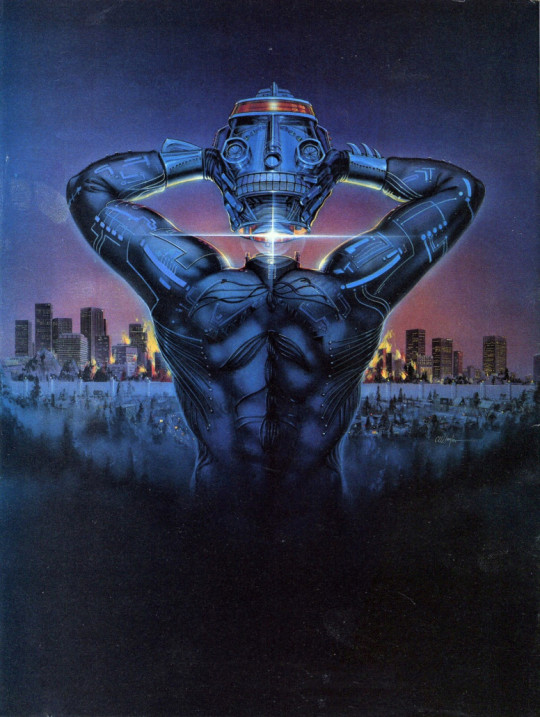
Decapitron (1986) Interchangeable technology is a popular theme at Empire. One of the more ambitious films is Decapitron, currently subtitled “The Devastation Creation” and also written by Paul De Meo and Danny Bilson. The Decapitron is a robot with five different heads: a surveillance head, which is an extremely sophisticated information gathering and observation device, an omnitech head, which is an all-purpose utility-super analyzer unit useful for biochemical breakdowns, medical diagnosis and crime detection; a humanoid head, which can simulate the appearance of any human male in his mid-thirties; a war head with advanced firepower, and finally, a doomsday head, the ultimate weapon of last resort.
The film was to be directed by Peter Manoogian, however, following the collapse of Empire Studios in 1989, and no doubt fueled by the cool reception given to Empire’s other ‘big’ picture Robot Jox, the script was finally shelved. Bilson & De Meo then went on to write the screenplay for the Disney’s The Rocketeer in 1991. The character of Decapitron was, however, to re-appear in micro-form as one of the puppets in Jeff Burr’s entry in the Full Moon killer toy franchise Puppet Master 4 and Puppet Master 5.
Paul De Meo acknowledges that “Decapitron” is an outgrowth of Eliminators, which was an intriguing idea. Charles Band wanted to go further with it. While the Mandroid is half man, half machine, the Decapitron is all robot. Unlike the Terminator, he’s the good guy. He has a kid sidekick, and they go into a city which has its own rules there’s been a plague in the city and it is under quarantine. The inhabitants are survivors of a biological disaster.”
Bilson and De Meo believe that a good sense of humor delicately applied can compensate for a less than generous budget. Trancers derives humor from its bizarre situation and future slang. In Eliminators, the Mandroid keeps commenting on how unbelievable and comic-book-like the whole thing is, putting the audience on his side. De Meo is aware that the proper tone for a picture is important. He and Bilson like to add humor but they are making action pictures, not comedies. Also, I may be wrong, but I remember hearing this film would’ve been Charles Band’s most expensive picture ever.
This slideshow requires JavaScript.
Why then are you spending $10 million on Decapitron? Charles Band: If one or two pictures out of 25 cost that much and all the rest average $2-3 million, we’re still pretty true to our formula. There are pictures that will cost more only because of what it’ll take to make them. It’s not because we’re putting in a $4 million star or spending a million dollars on a director. Decapitron has huge amounts of special effects, pyrotechnics, pieces of city blocks getting blown up it’s just an expensive movie to make. Sometimes a project comes along that we’re so excited about that we want to do it justice. Many pictures we make are designed to be made on a budget, but we don’t want to short- change the story or the movie itself. You can make, in theory, a brilliant horror film if your location is a house. You don’t need $20 million and a lot of special effects. On From Beyond, for example, we have not only John Buechler, who is our close effects associate involved, but we have three other FX teams, too. There’s a huge amount of special effects half the budget of this expensive picture Is going to effects. But again, if your picture takes place In a house in this case, a very large house it’s limited in many potential costs. But If your picture takes place in the future on some planet, in Los Angeles on city streets, with many effects, it costs money. In the case of Decapitron and one other picture that we’ll be announcing soon, the budgets are up there. But everything else is averaged out at about $3 million.
“I did read the DECAPITRON script. It was pretty good though there was a fundamental flaw in the premise. The central character was supposed to carry 5 or 6 replacement heads capable of different functions. Since, in reality, the heads would be masks worn by an actor, they would have to be larger than normal. The script described him carrying them in something the size of a briefcase when it would really have to be the size of a footlocker. Imagine a character dodging bullets and running through action scenes lugging something that big!” – Kenneth J. Hall (film-maker)

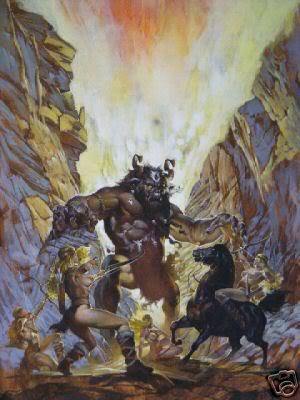
Barbarian Women (1986) Another sword and sorcery film, probably set in the future or another dimension.

Bloodless (1986) Jungle/Ancient horror maybe. Slasher or vampire. Anyone got anything?
Journeys Through The Darkzone (1986) Written by Danny Bilson and Paul De Meo (Eliminators), I got nothing much on this. The title was used later as a tagline for Trancers 4.


Show No Mercy (1986) Would be action flick directed by Peter Manoogian.
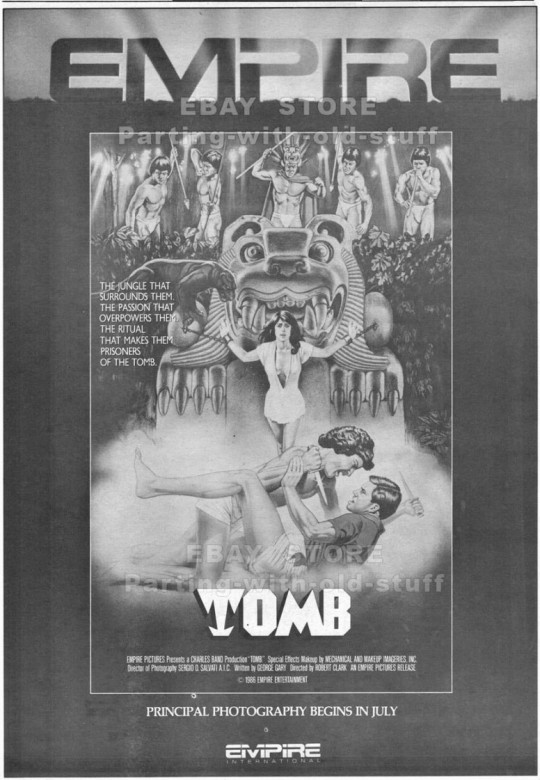
Tomb (1986) Unmade jungle thriller.
Murdercycle (1986) Originally titled BATTLE BIKES, info is unknown on this version, but fans would later see this art and title recycled for a future Full Moon release about soldiers fighting a robotic alien.
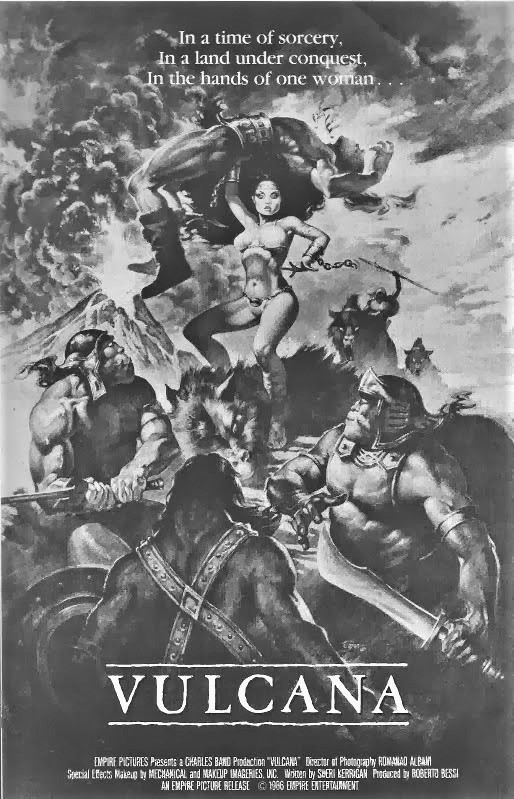
Vulcana (1986) Action/fantasy about a warrior woman.
Charles Band & Jack Kirby Unfilmed Projects
This slideshow requires JavaScript.
Mindmaster (1986) involves a scientist who is caught in an accident which leaves him debilitated, and must use a thought-controlled robot he invented to stop a crazed fellow scientist.

Doctor Mortalis (1986) is an all-powerful wizard, the leader of a secret sect of sorcerers known as The Dark Order. His faithful sidekick, “Egghead,” is a witty half-human, half computer genius who possesses fantastic special powers.
Legion of Doom This was going to be Charles Band’s superhero team movie. He once stated that films like Mandroid and Invisible: The Chronicles of Benjamin Knight were efforts to slowly build characters for a team movie. So it’s entirely possible Dark Angel and Doctor Mordrid could have been on the team as well in this movie.
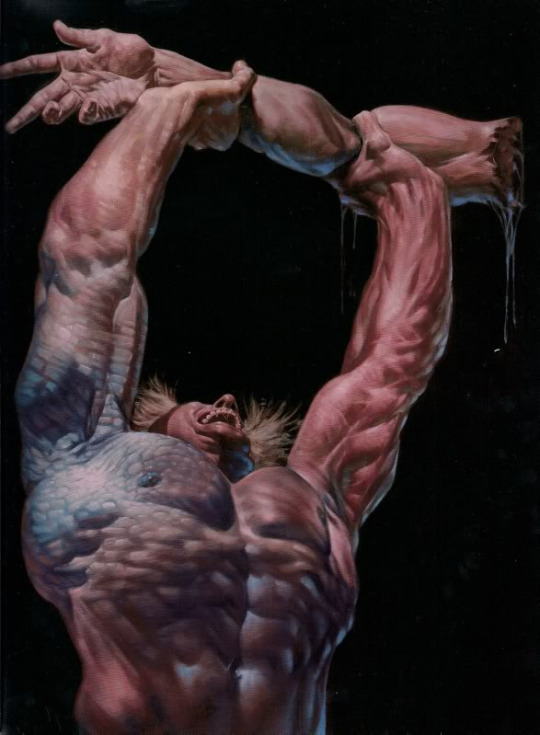
Berserker (1986) Unfilmed A big fan of RE-ANIMATOR, Arnold Schwarzenegger and Stuart Gordon and Dennis Paoli wrote BERSERKER, about a bodybuilder who abuses steroids and becomes a mutant.
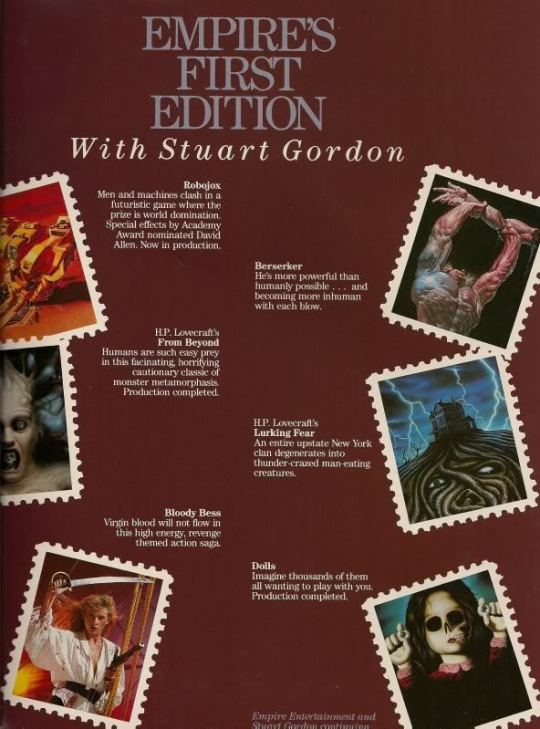
Bloody Bess (1987) Unfilmed Stuart Gordon planned this adventure movie around the time he was making From Beyond, and also first attempting to raise a decent budget for his pet project The Shadow Over Innsmouth. It was to star Jeffrey Combs, and Barbara Crampton as a female pirate, out to drink rum, steal gold, and generally show the boys a thing or two about buckling swashes. Rumour has it ex-Empire director Renny Harlin (Prison, Die Hard 2) must have liked the idea, since he lifted it for his 1995 box-office bomb Cutthroat Island, which I have never bothered to watch.

Pand Evil (1987) To be produced and directed by Gorman Bechard (Psychos In Love, Cemetery High).

Fiends (1987) Info not known at this time.
PULSEPOUNDERS (1988) Incomplete An unfinished Empire Pictures film directed by Charles Band, and starring Tim Thomerson, Helen Hunt, Jeffrey Combs, Barbra Crampton, and Richard Moll.
Here’s what I’ve heard Charles Band had to say about PulsePounders: “PULSEPOUNDERS is completely shot, it just needs post-production,” says Band. “I still hope to get it out of the mess it’s tangled up in and release it. David Gale is terrific in it, and with him gone now, it’s all the more reason to get it out where people can see him one last time.”

Now here’s what Jeffrey Combs had to say: “Pulsepounders is a real curiosity,” Combs says. “It’s a movie – or a segment of a trilogy – that i did back in the 1980’s while over in Italy. As far as I knew, that movie never got finished. Empire Pictures, Charlie Band’s company at that time, tanked. So that film was in pieces and incomplete, and so far as I’d heard just lost in the wars. Now it’s showing up on the internet as something that’s coming out. I did my segment soon after Re-Animator with Barbara Crampton, the late David Gale and David Warner. Other than the dailies I saw at the time, I never heard or saw anything about it again until information about it suddenly turned up on the internet. So who knws about that. Maybe the next time I talk to Charlie Band, I’ll ask him about it.”

“I was in a segment called ‘The Evil Clergyman‘, based on a Lovecraft story, Combs continues. “They did a short Trancers / Jack Deth story “Trancers: City of Lost Angels” which Helen Hunt was in. And they did one more with Richard Moll, based on another Empire Pictures movie [Dungeonmaster] that had been successful. So it would have been three little odd and hastily connected pieces. They’d all been shot, but they were never able to finish them up.
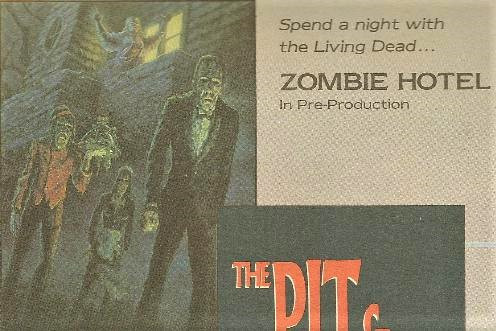
Zombie Hotel (1989) “Spend a night with the Living Dead.” Subspecies director Ted Nicolaou was set to direct.
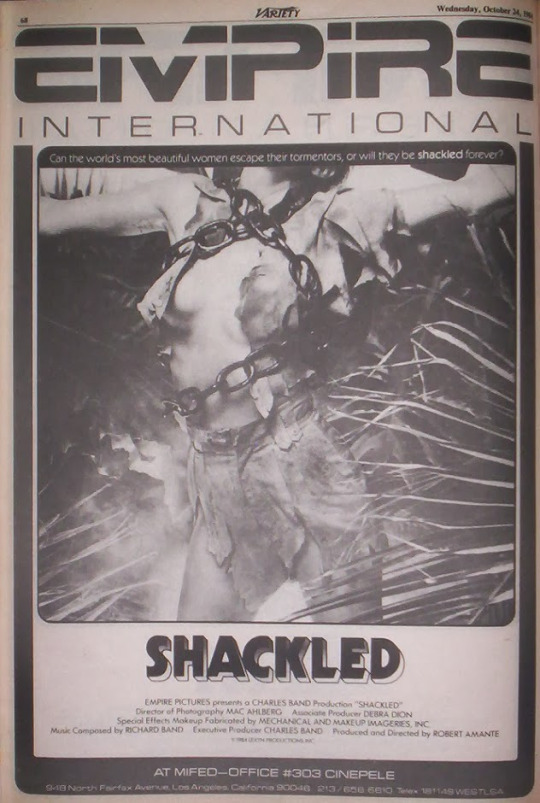
Apparatus (1989) A Futuristic thriller that was to have been directed by Larry Cohen (It’s Alive) that apparently concerned “Big Brother'” types controlling the masses through apparatus attached to their bodies. Abandoned also when Empire Pictures folded.

Hotel Dick (1989) Another Empire comedy to be produced by Frank Yablans (Buy & Cell, The Caller).
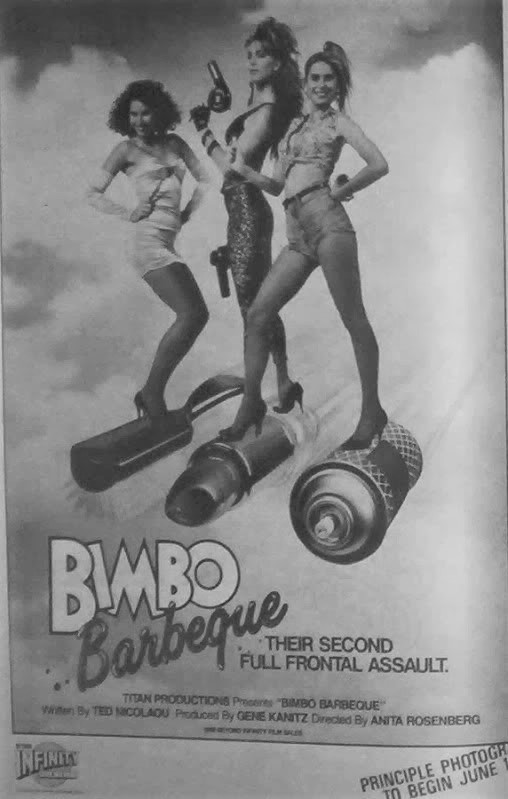
Bimbo Barbeque (1989) A planned sequel to Assault of the Killer Bimbos, a girls on the run sex comedy that inspired THELMA & LOUISE. It’s mentioned in ASSAULT’s end credits.
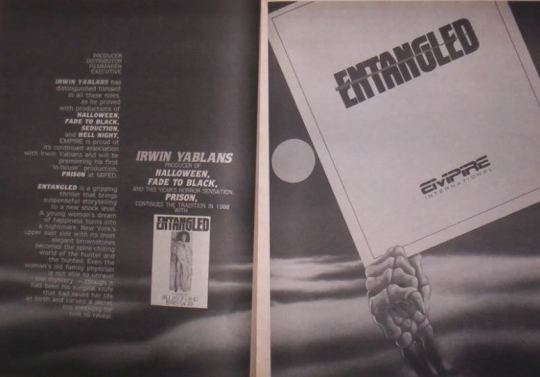
Entangled (1989) Would’ve been produced by Irwin Yablans (Halloween).
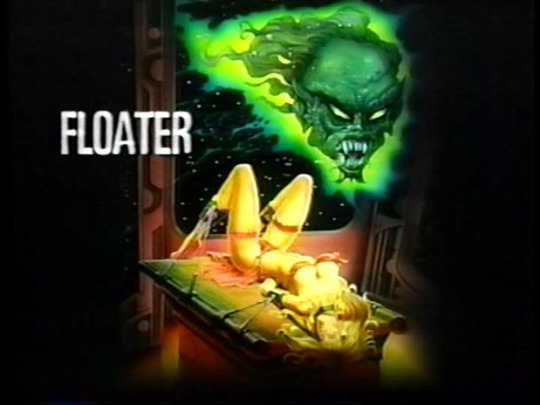
Floater (1989) Tobe Hooper (Texas Chainsaw Massacre 1 & 2) signed on to make a $6 million supernatural thriller, one of Band’s occasional attempts at ‘top-drawer’ quality product. Again, the project was abandoned when Empire ceased. Tobe went on to direct Spontaneous Combustion instead.
Subterraneans (1989) Heard this was to be the first of a trilogy about a culture of small evolved apes that live in the NYC Subway Tunnels.
Empire Films Never Made Undated

Arsenal A no doubt action adventure.
This slideshow requires JavaScript.
Cassex Virtual reality sex comedy.

The Colony Apparently about yuppie witches.

Dolls 2 Director of the original Stuart Gordon was, at one point, very interested in directing a sequel. The initial storyline would have followed surviving characters Judy and Ralph back to Boston in which Ralph would have indeed married Judy’s mother and they would all become a family. Until, one day Judy would receive a box sent from England which would contain the toy makers, Gabriel and Hilary, as dolls. Gabriel was played by Guy Rolfe (Andre Toulon in Puppet Master 3, 4, 5, 7) by the way. It’s unknown to me why it was never made.

InHuman Info unknown at this time.
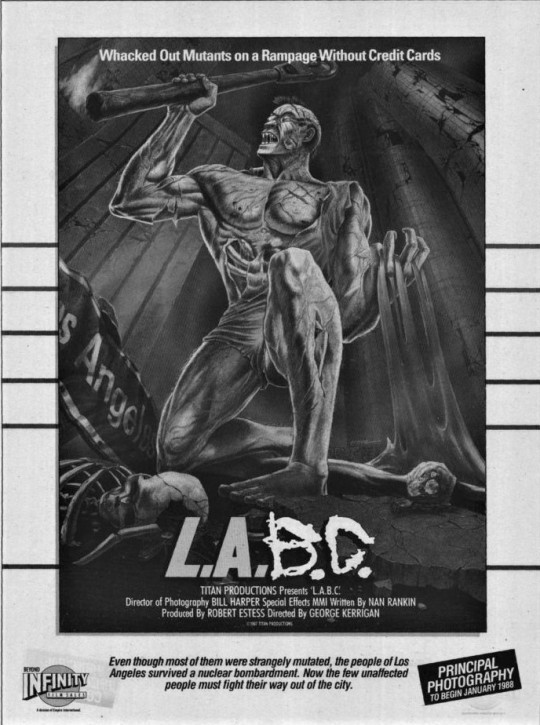
L.A.B.C. Anyone got anything? I suspect this to be a post-apocalyptic film, which were big in the 1980’s.
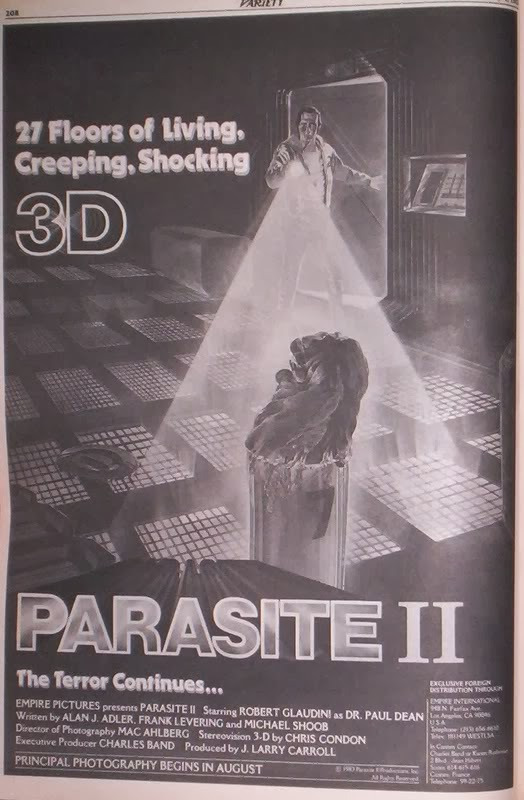
Parasite II Following the Charles Band/Demi Moore original, the sequel never hit the script stage after Embassy Pictures fell apart. According to the poster below, actor Robert Glaudini was expected to return.
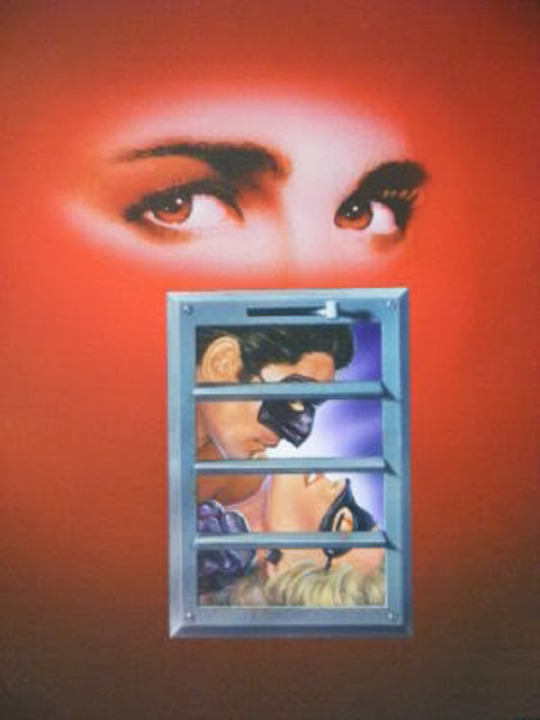
Shadows and Whispers Unknown about this possibly erotic thriller, to be directed by David Schmoeller (Crawlspace).
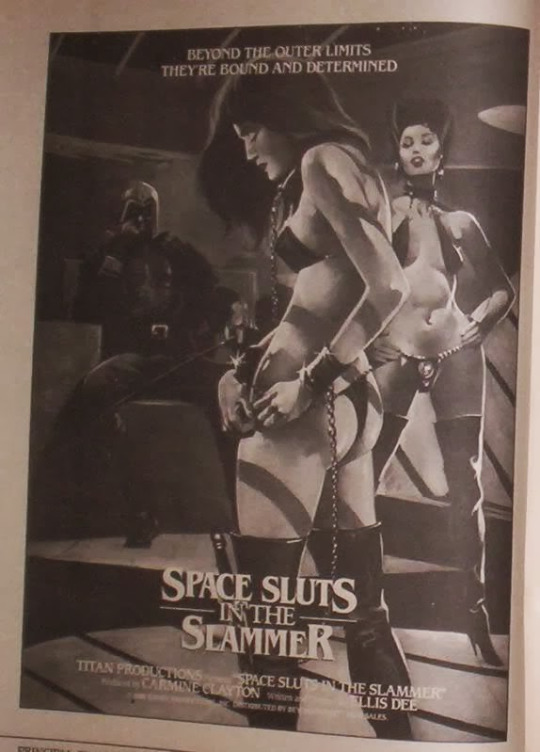
Space Sluts in the Slammer Possibly part of Charlie’s uncredited erotic Sci-Fi adventures like Slave Girls from Beyond Infinity.
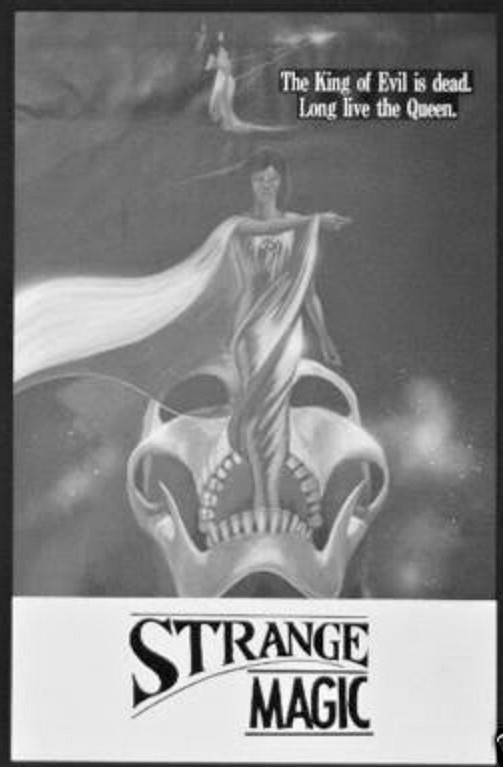
Strange Magic I got nothing other than this poster. “The King of Evil is dead. Long live the Queen.”
-tomboftheunproducedhorrormovie
The History of Empire Films Part Seven – Films Never Made (1980-1989) I Eat Cannibals (1980) Ted Nicolaou's forgotten action comedy. This was to be the "the most ferocious story of revenge ever filmed."
0 notes